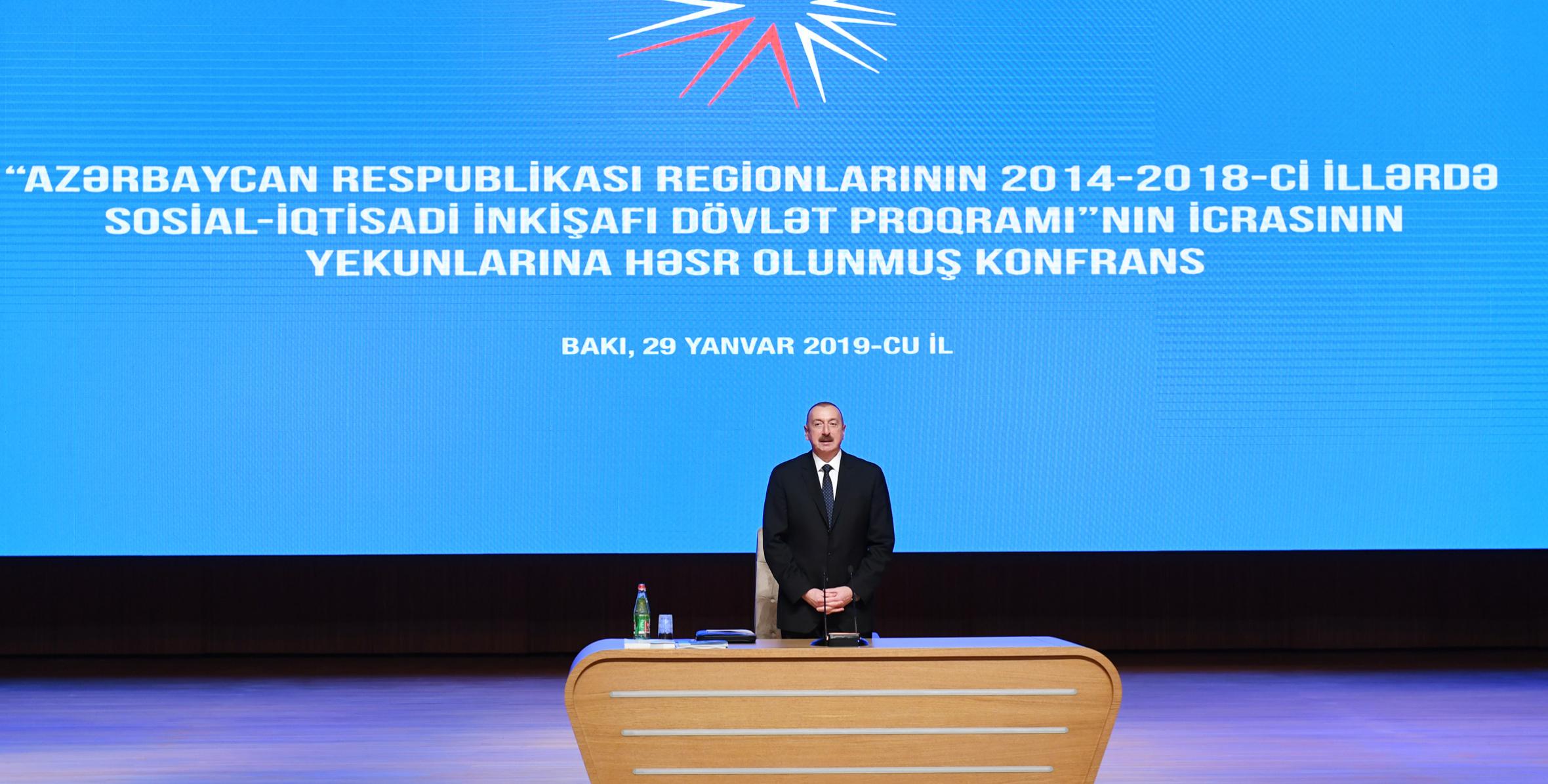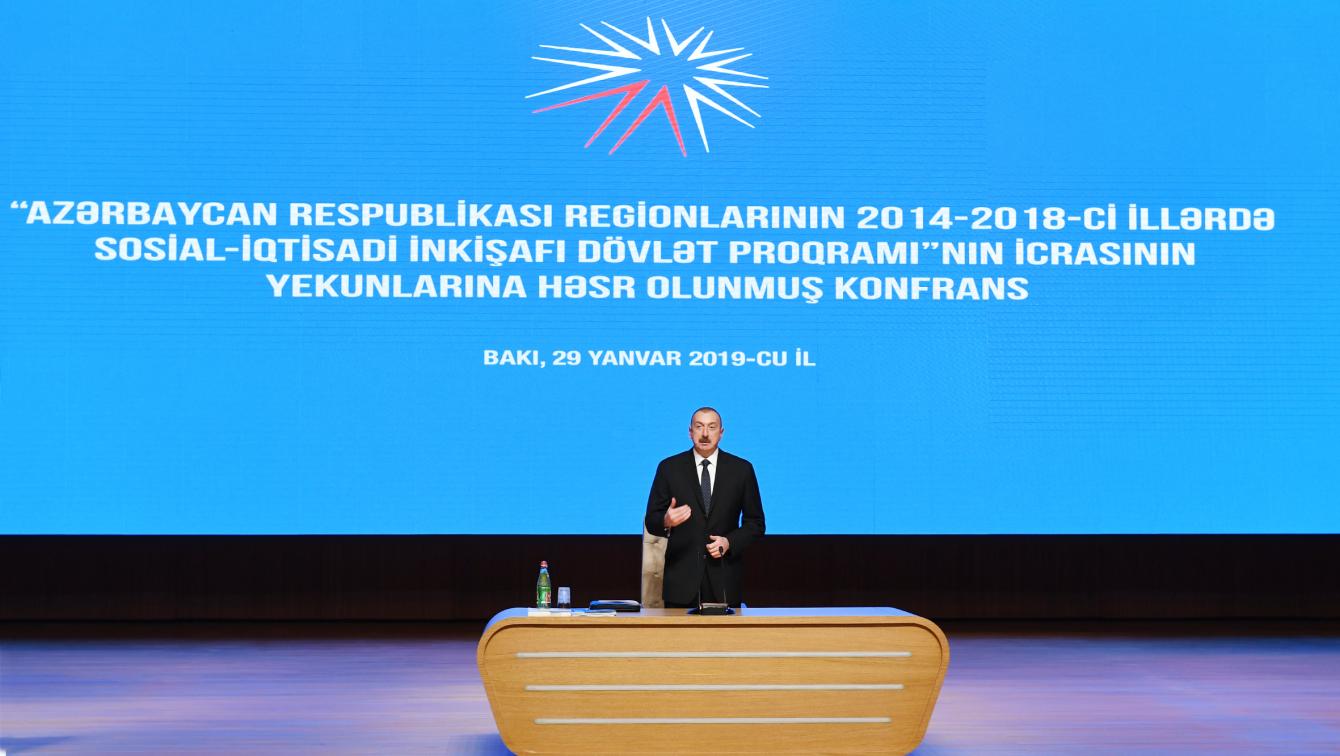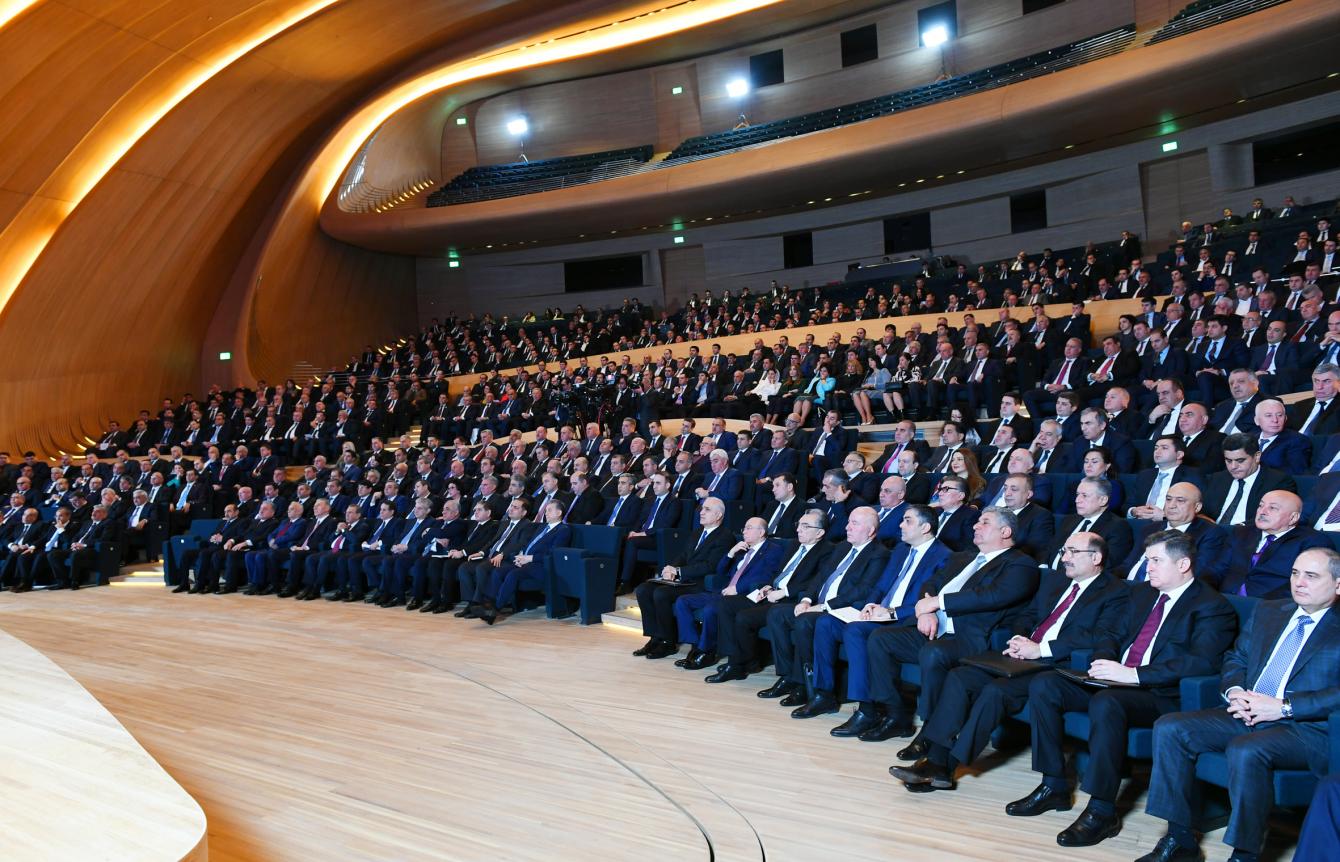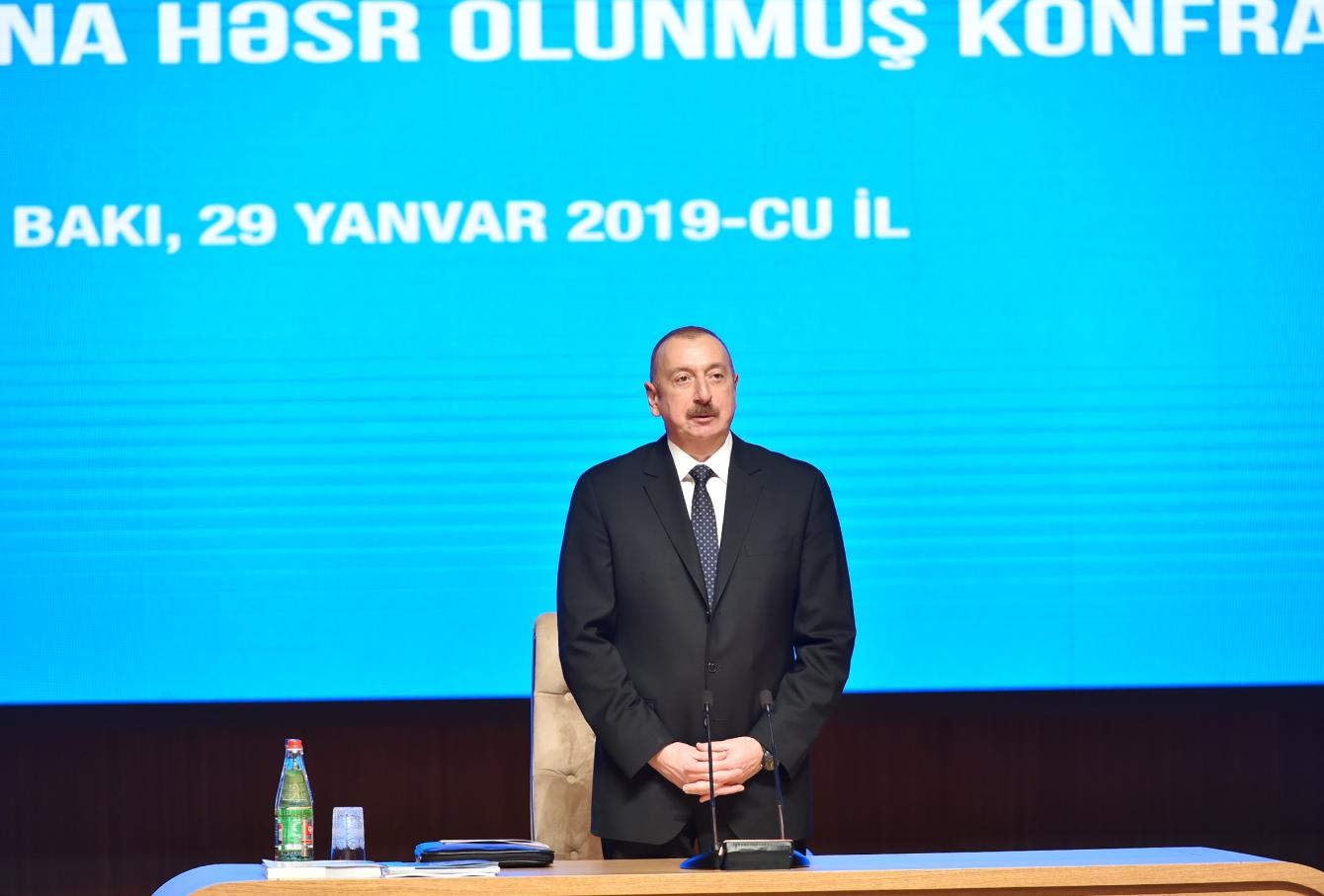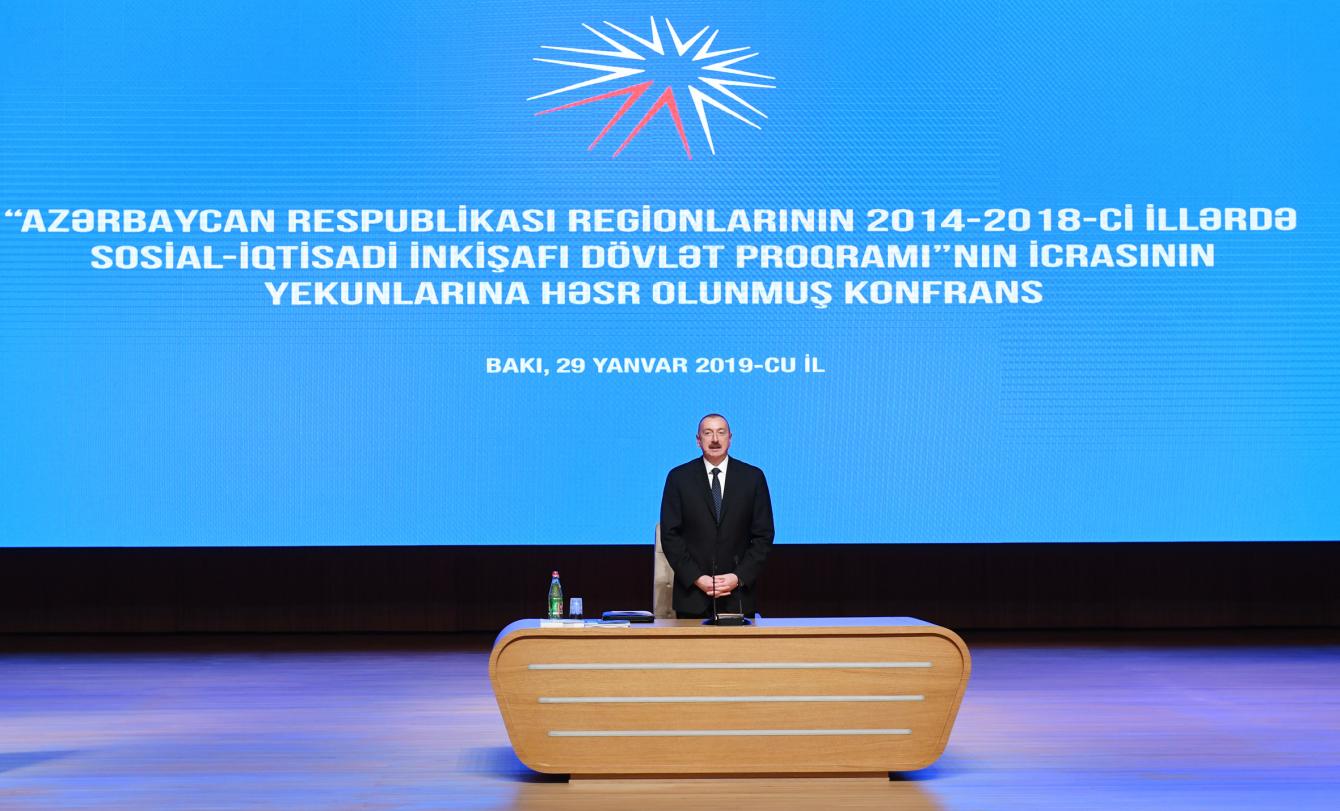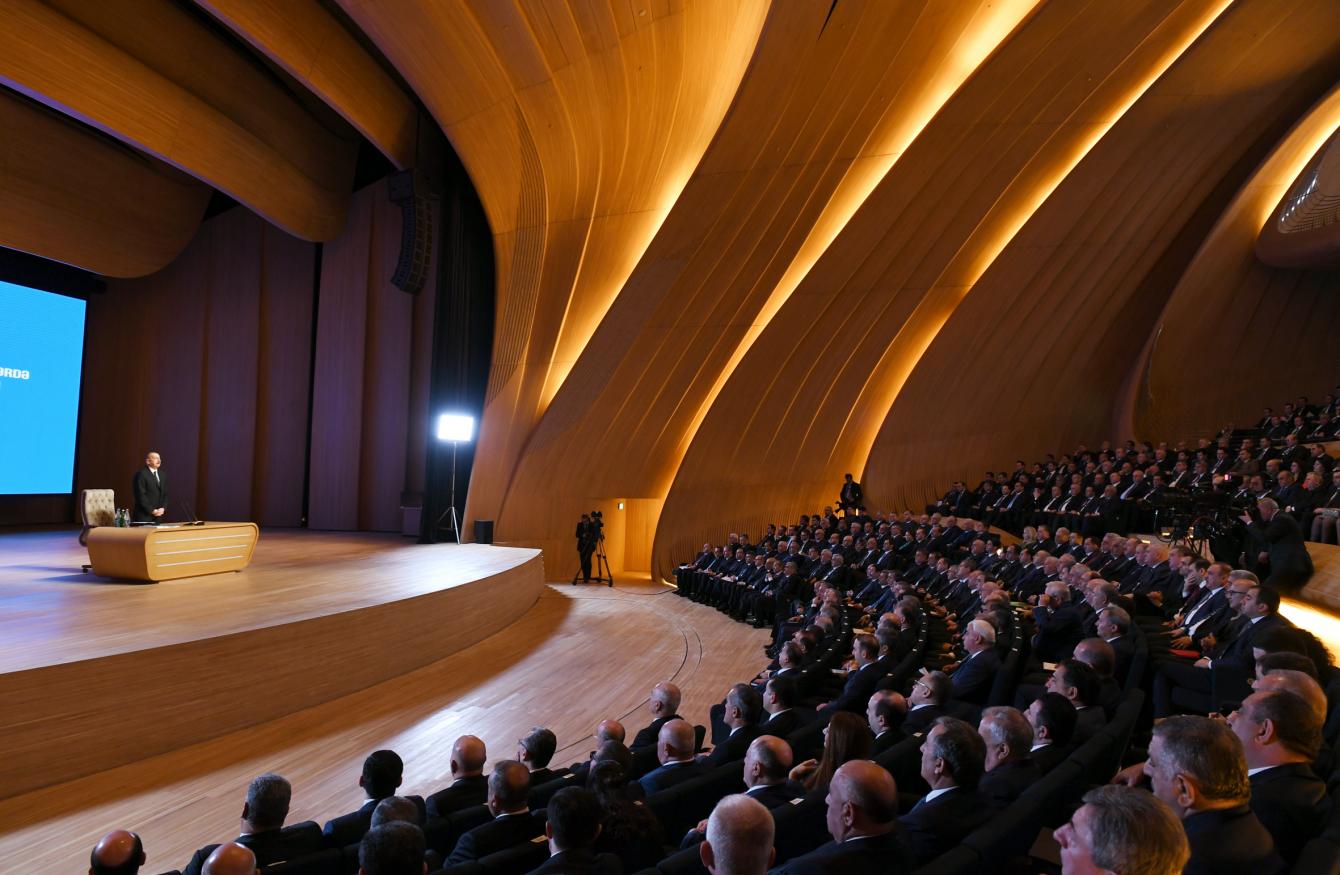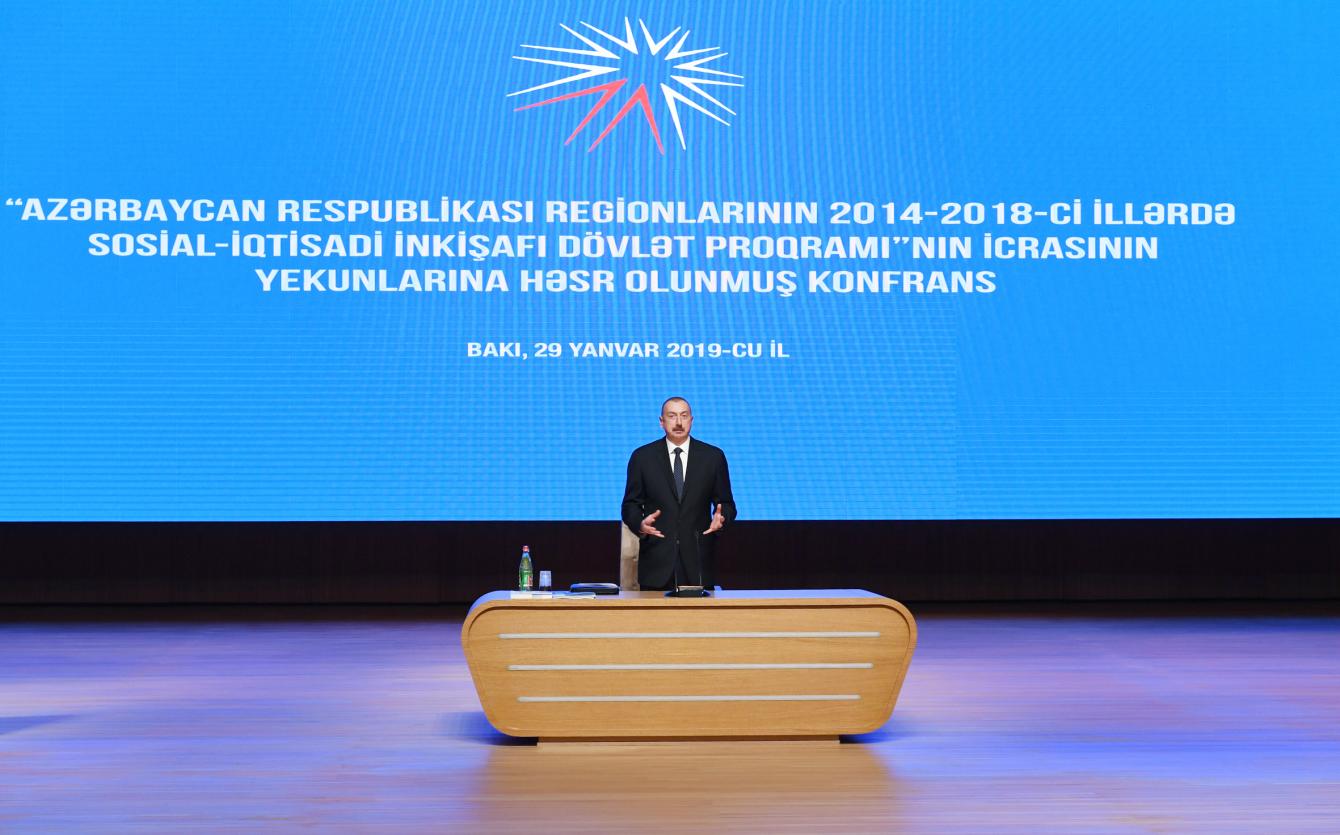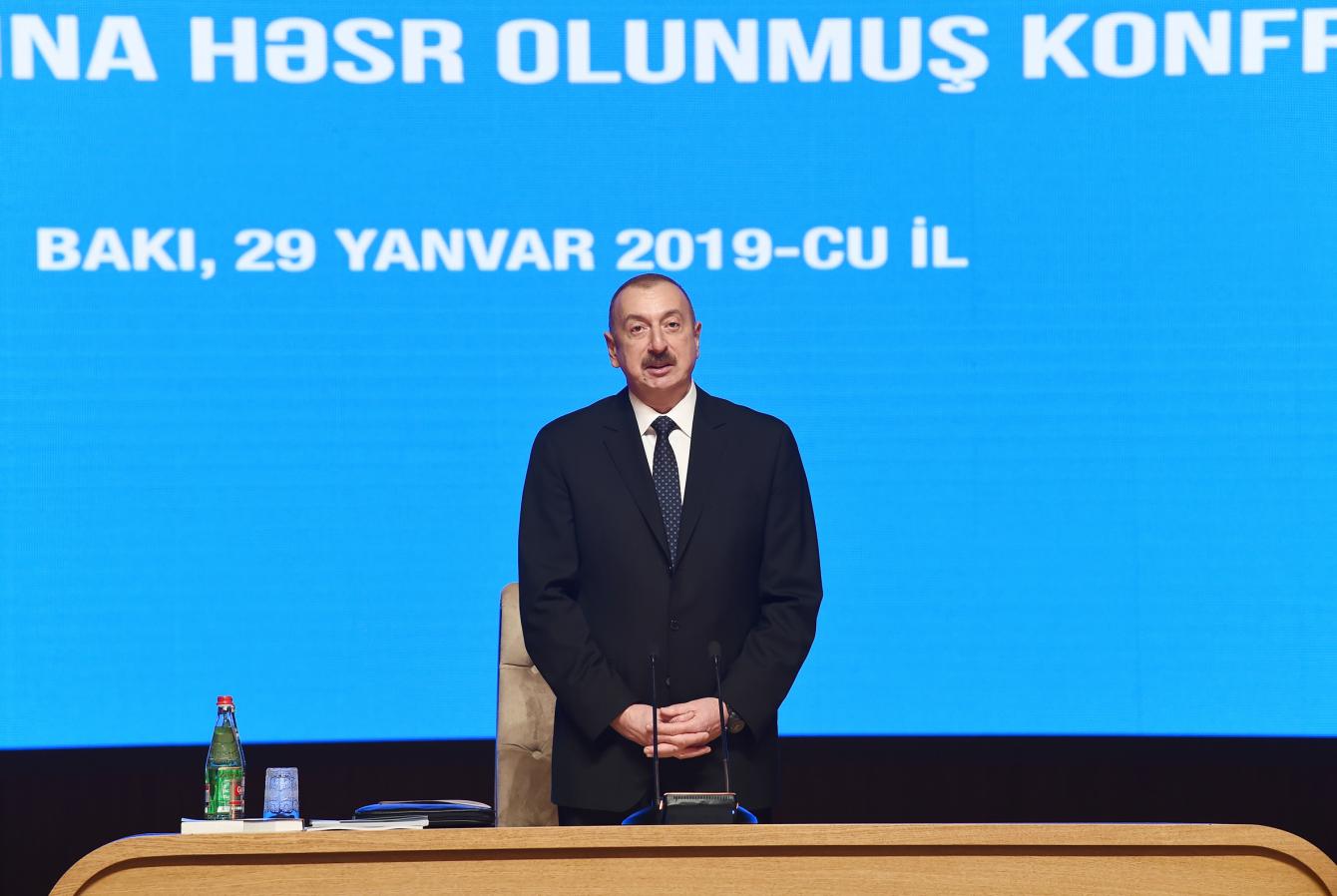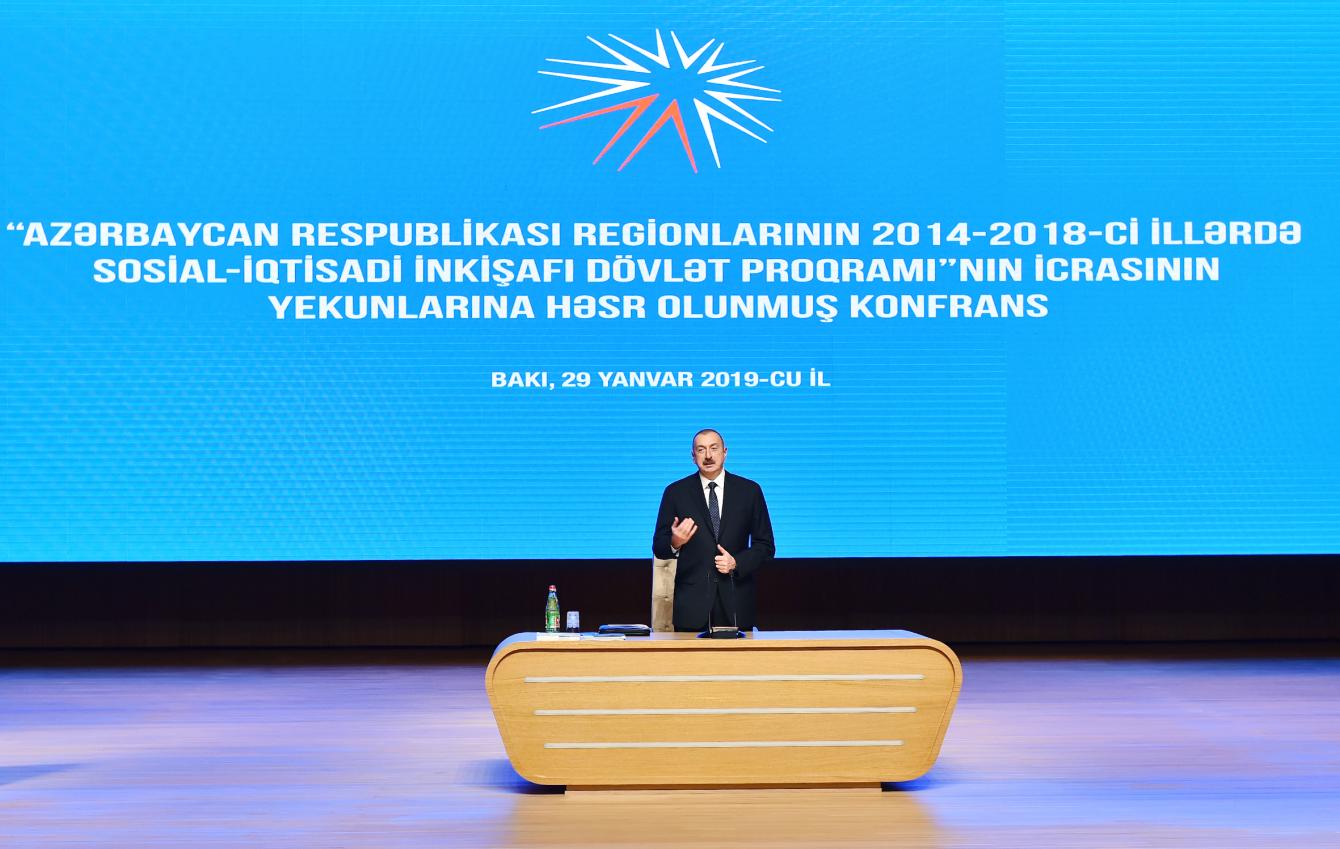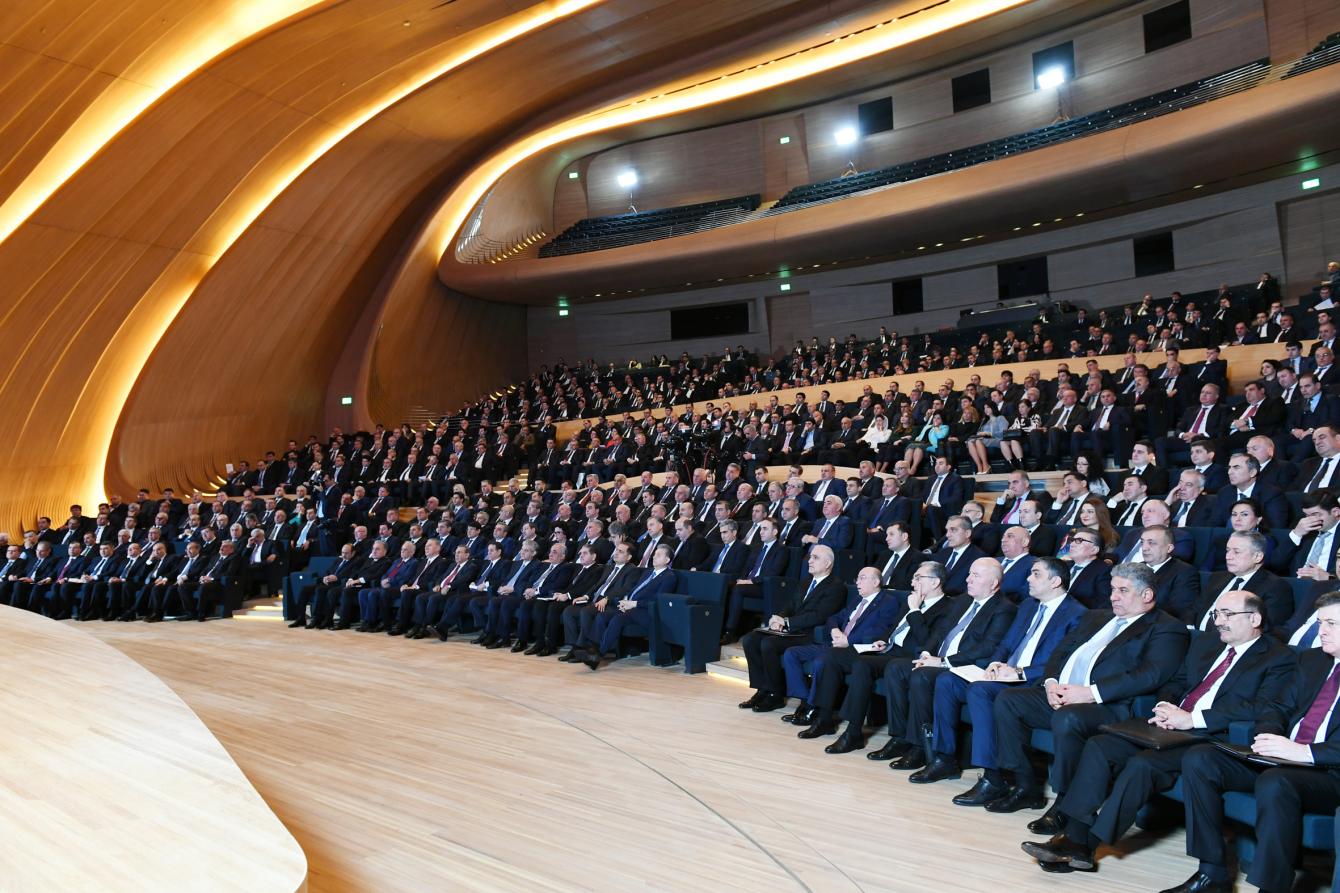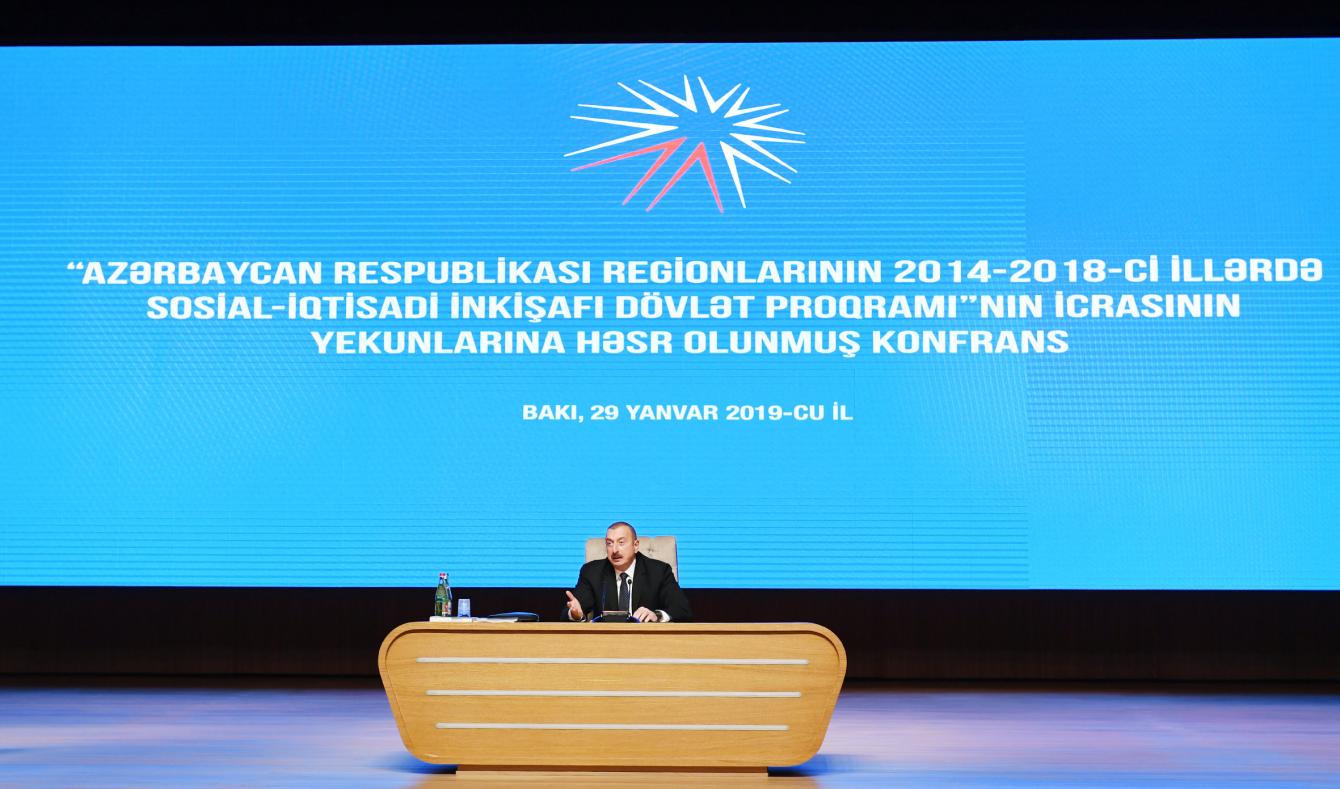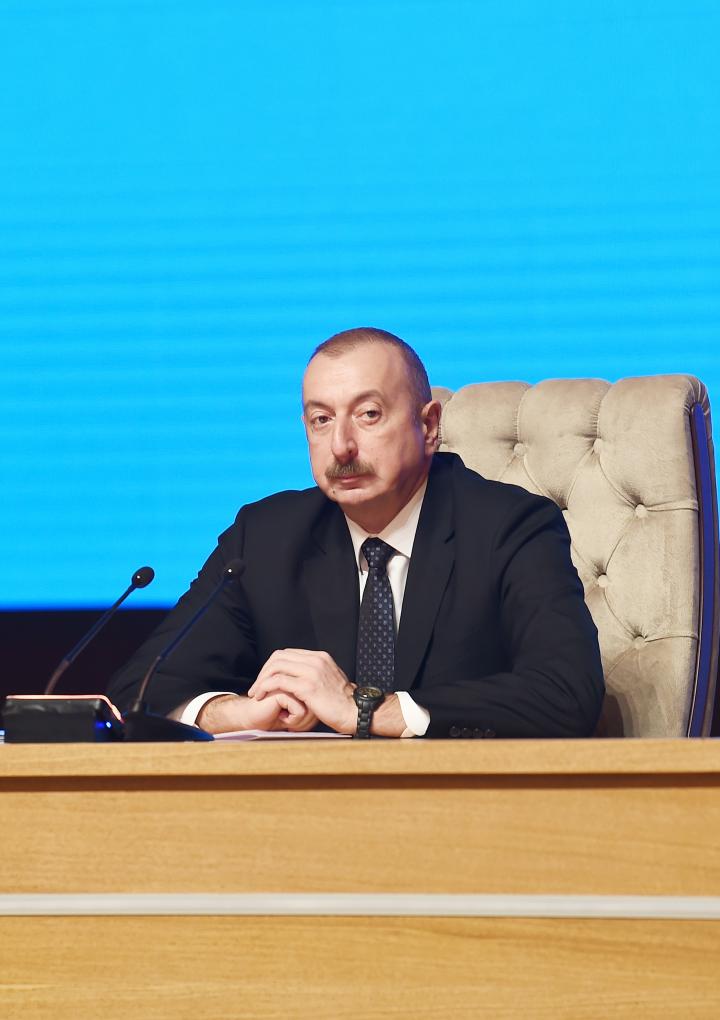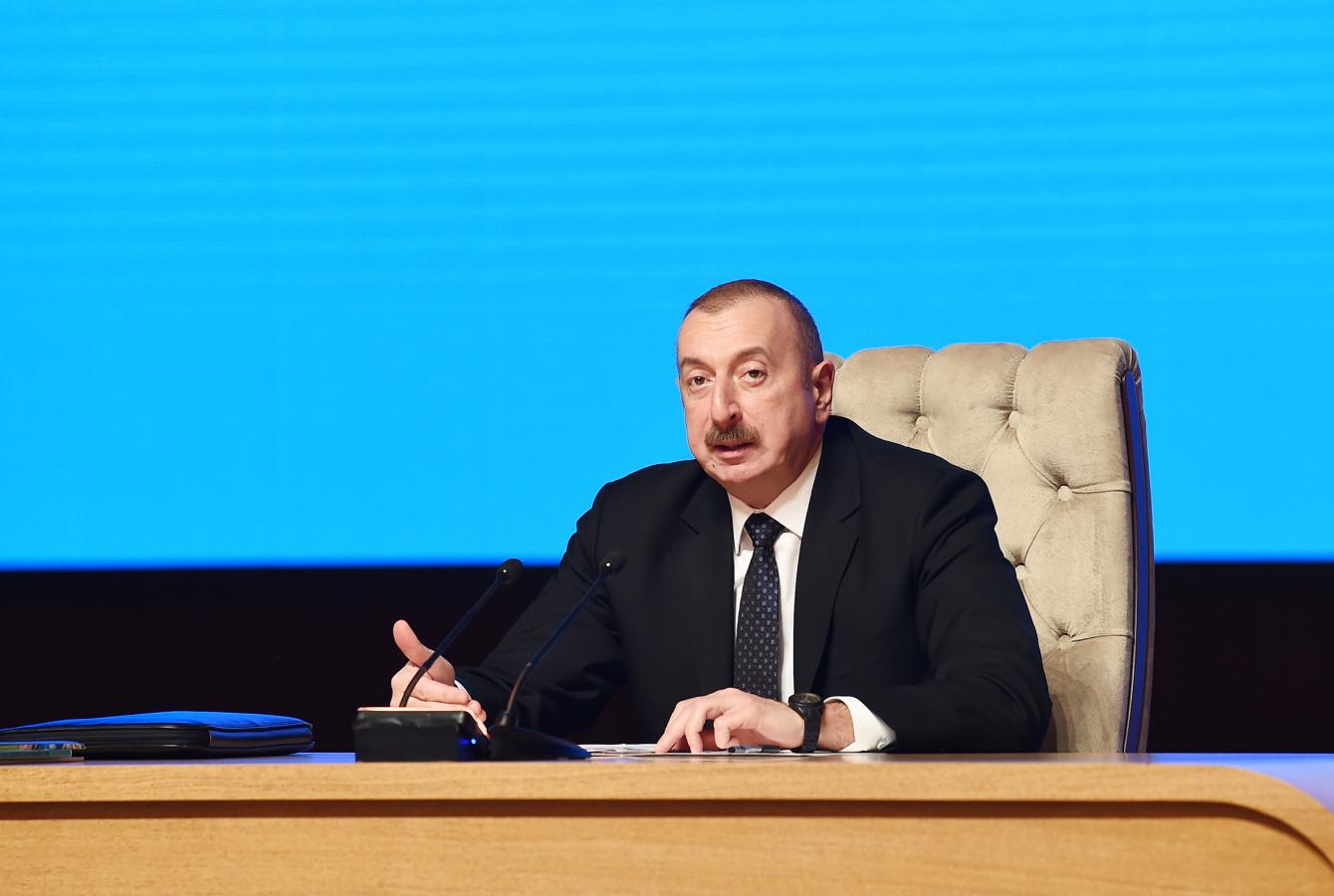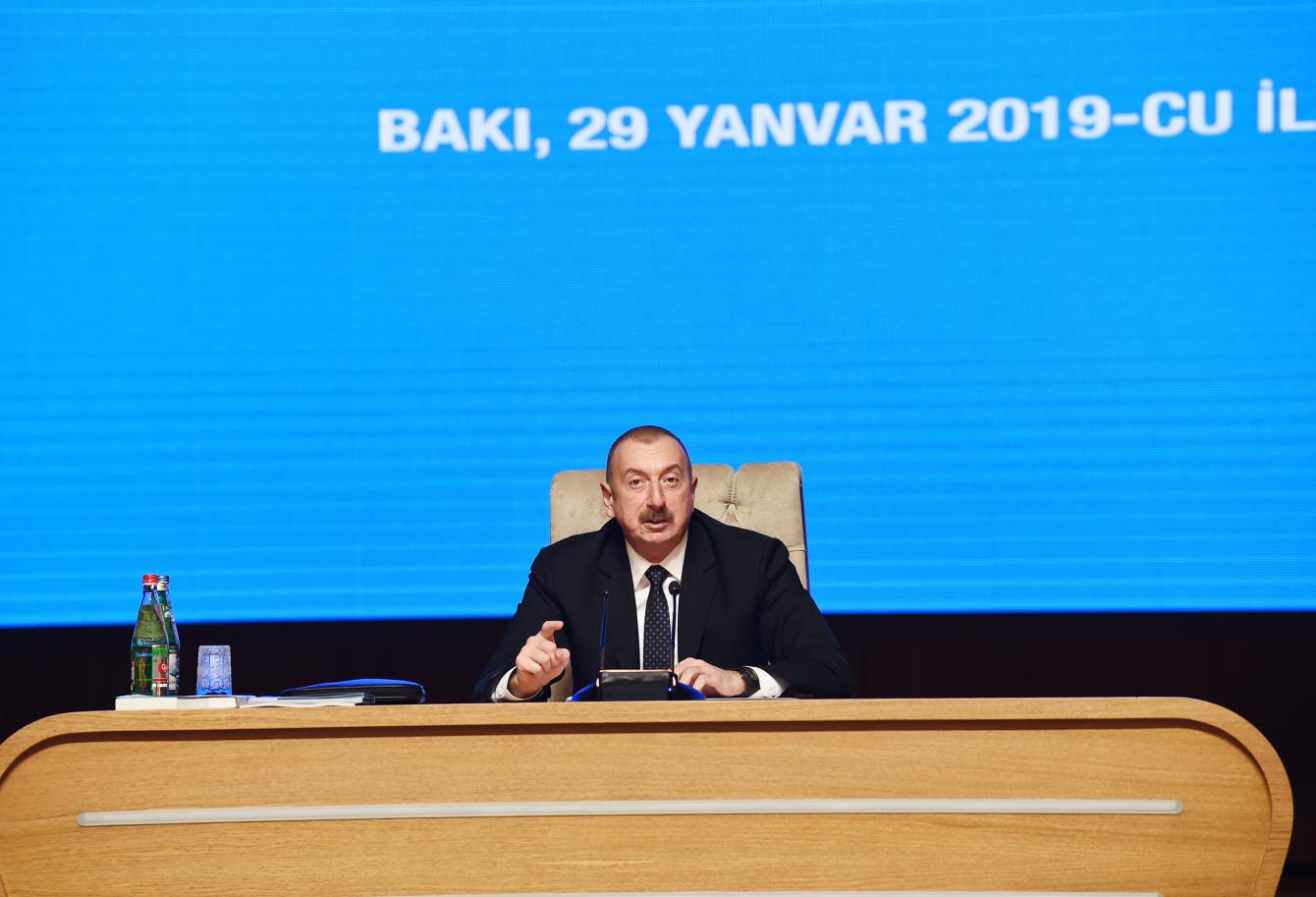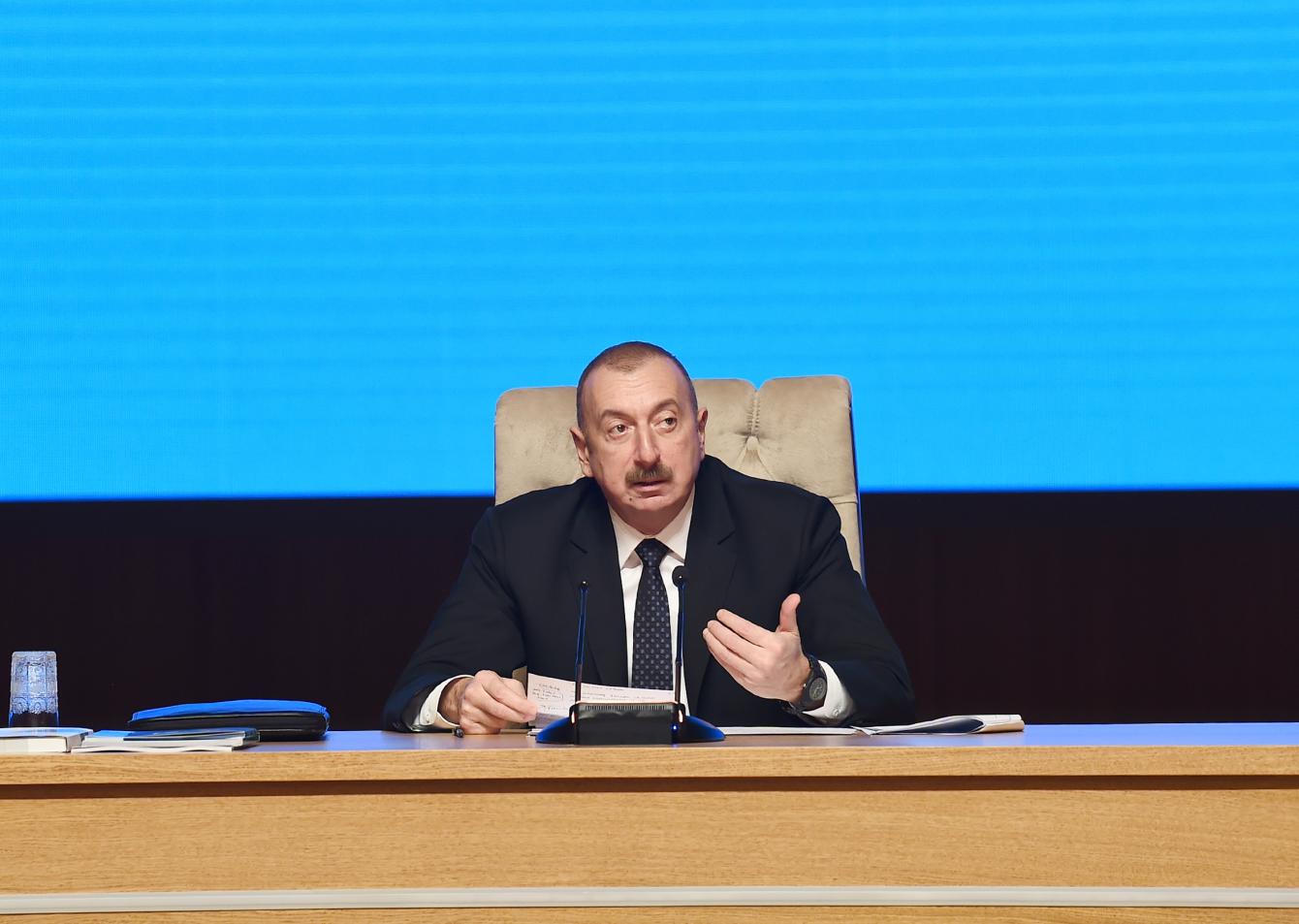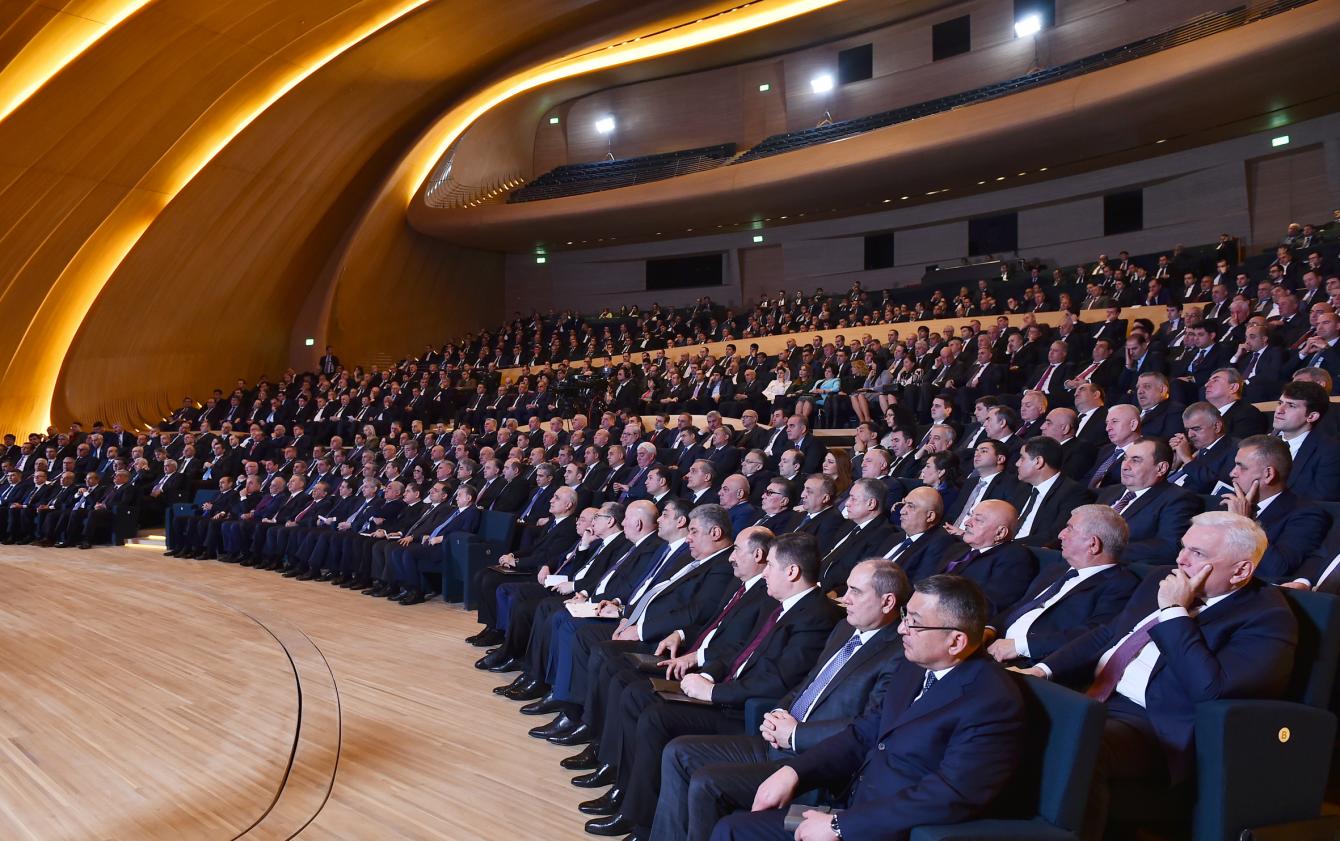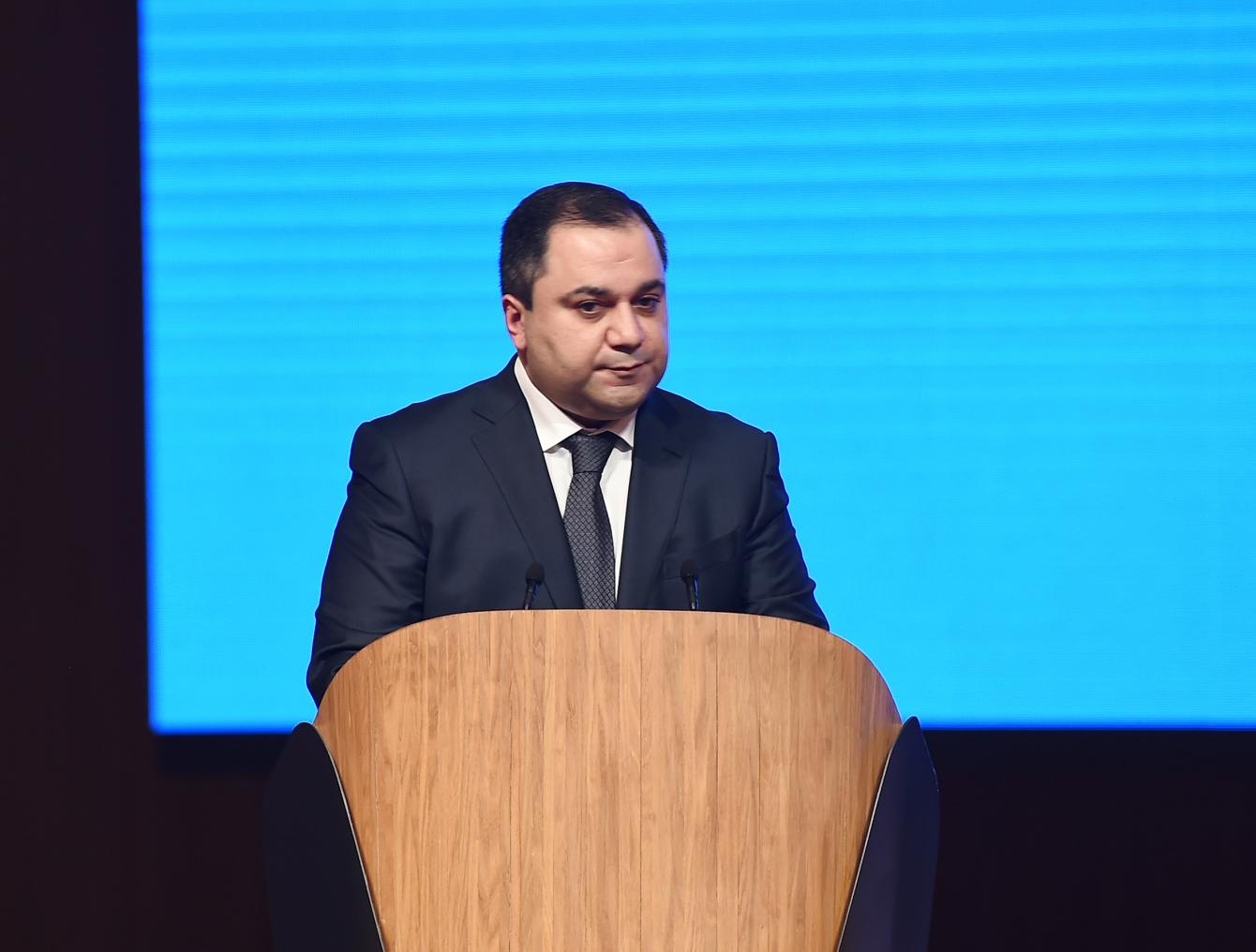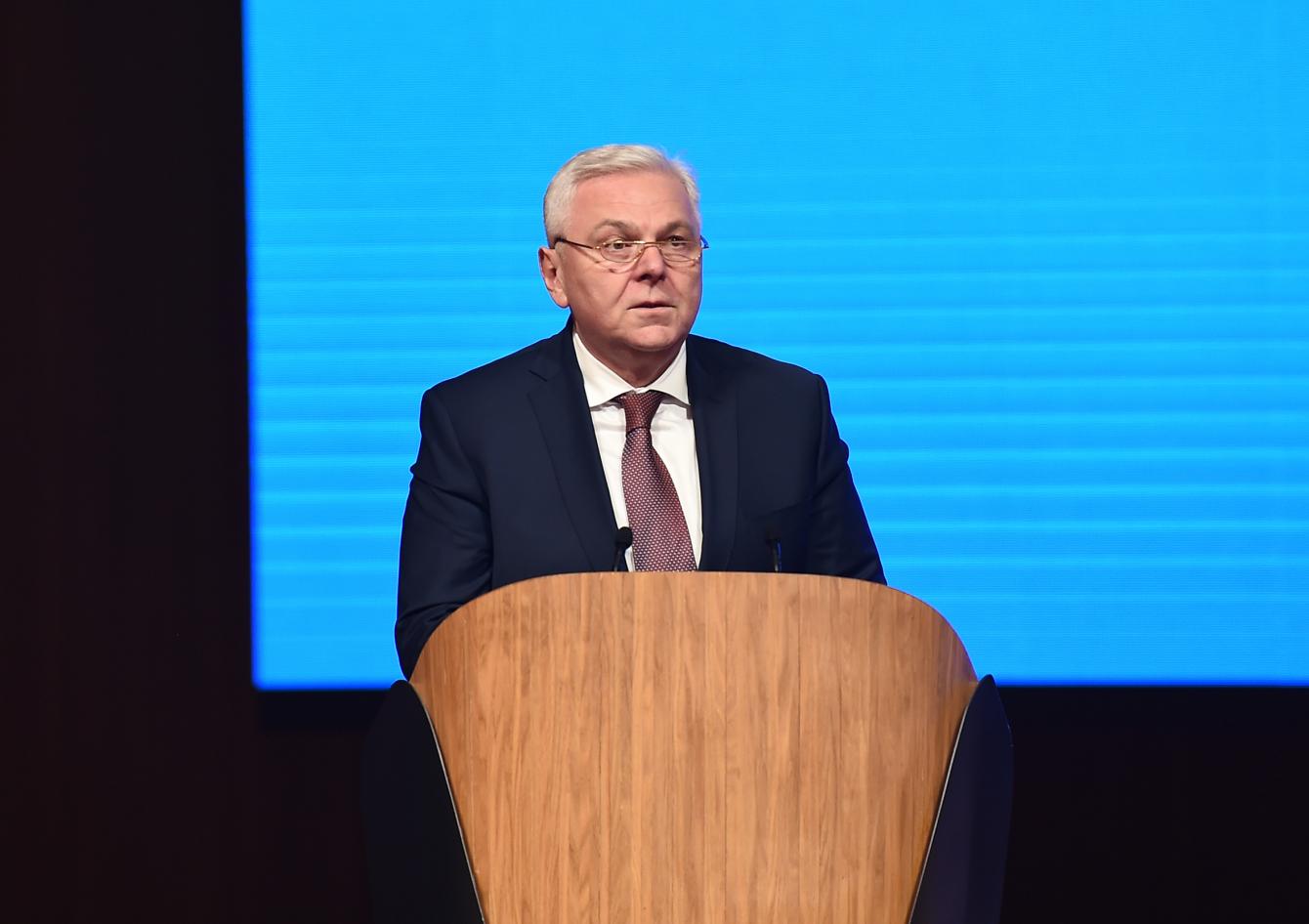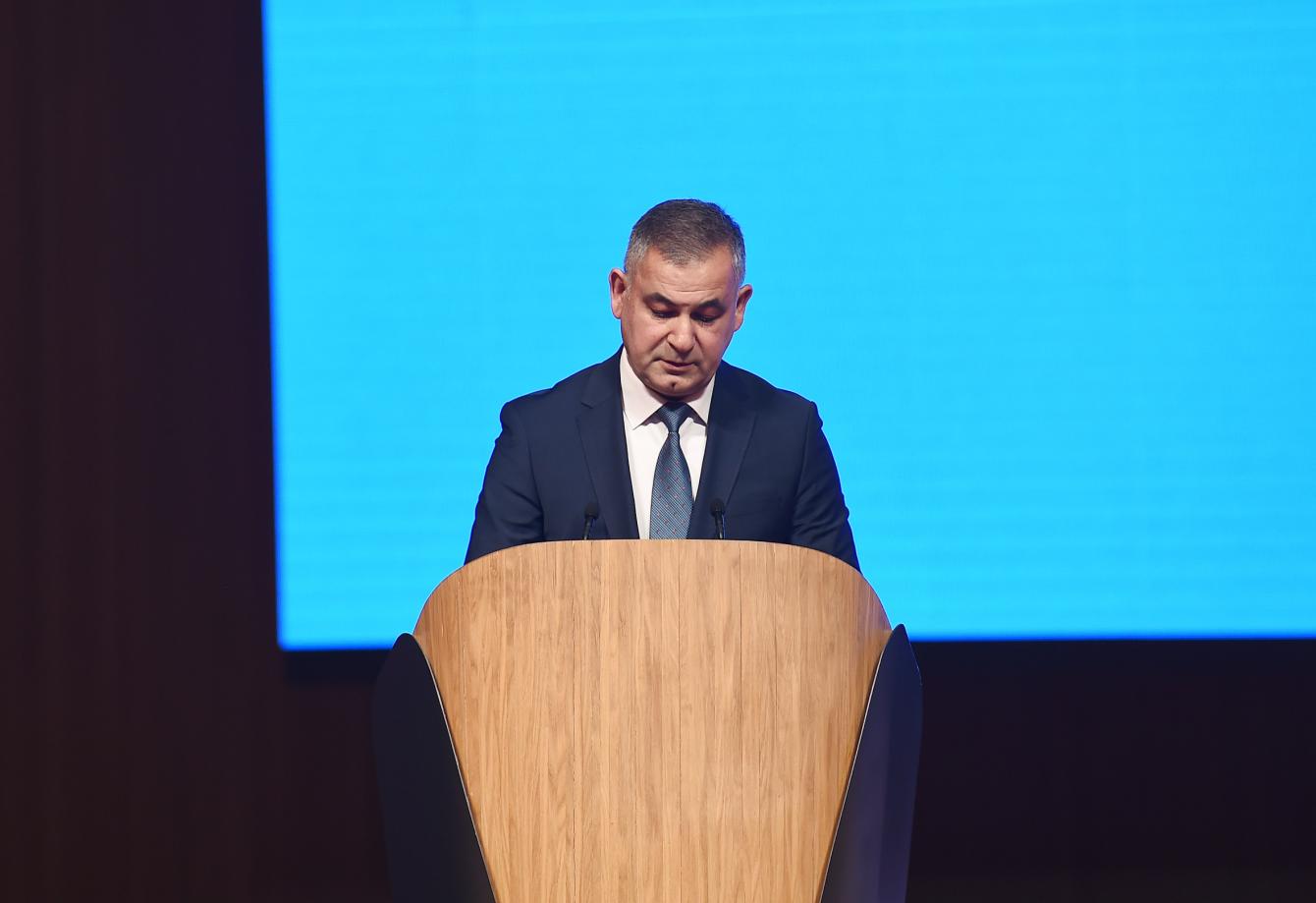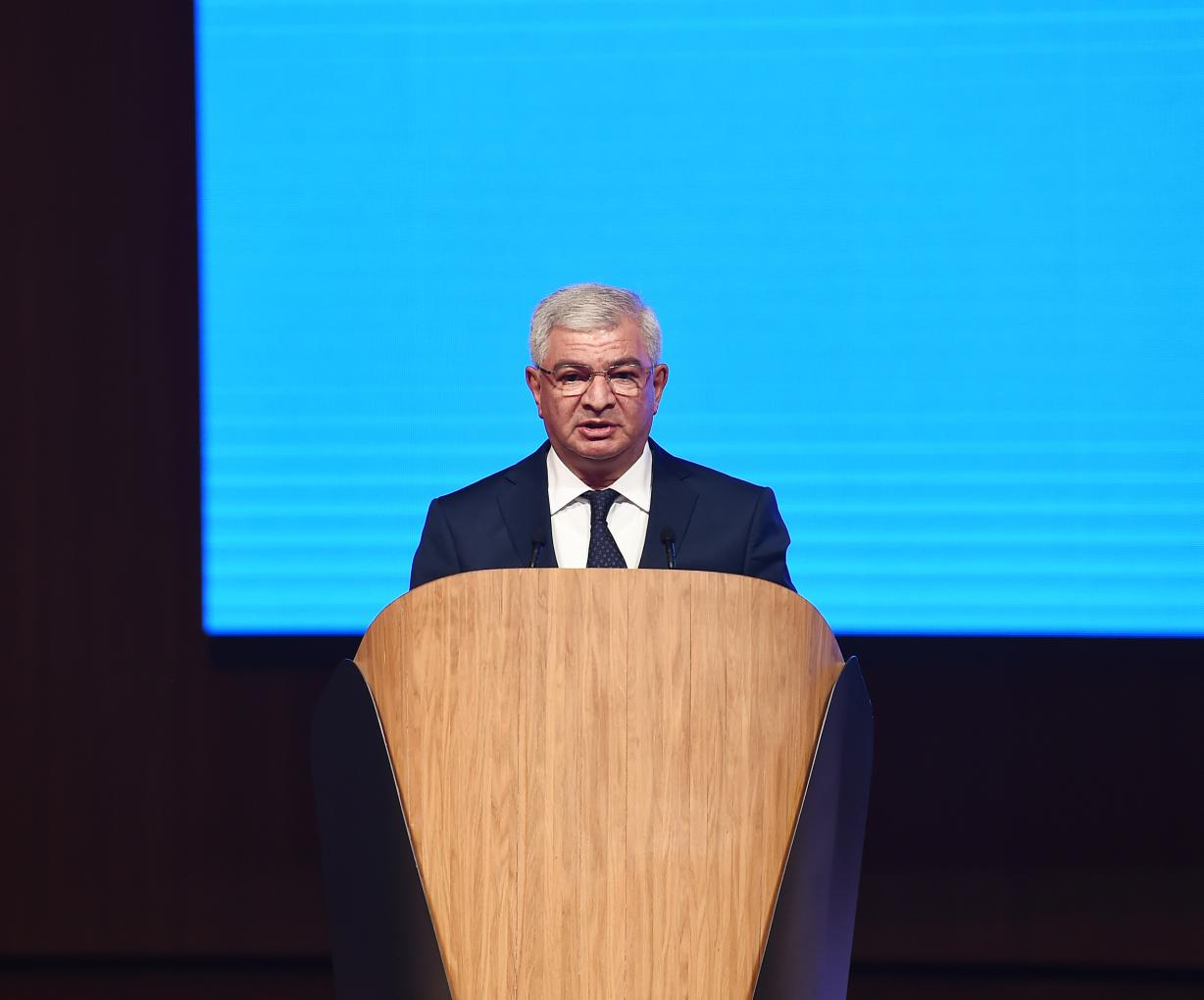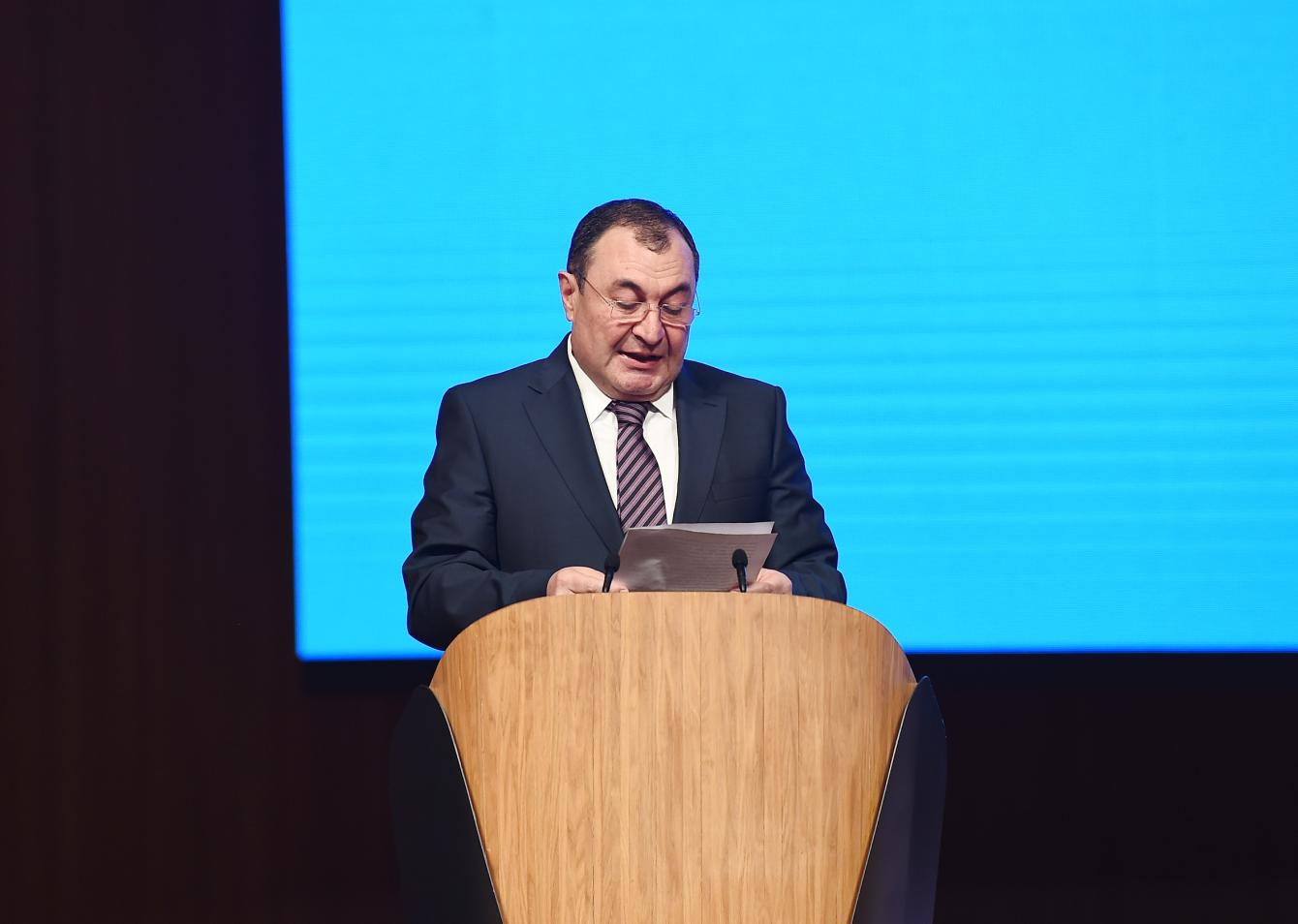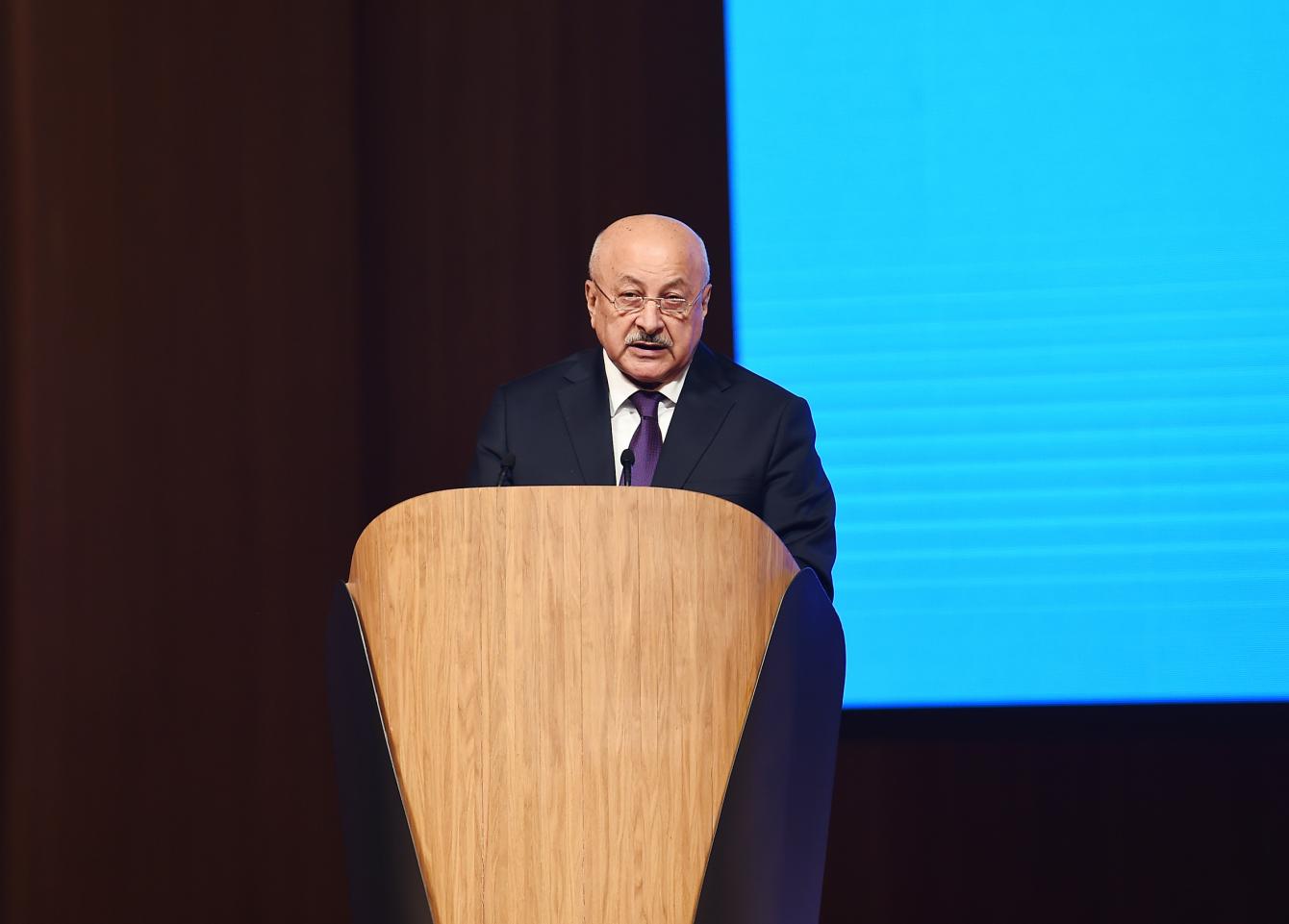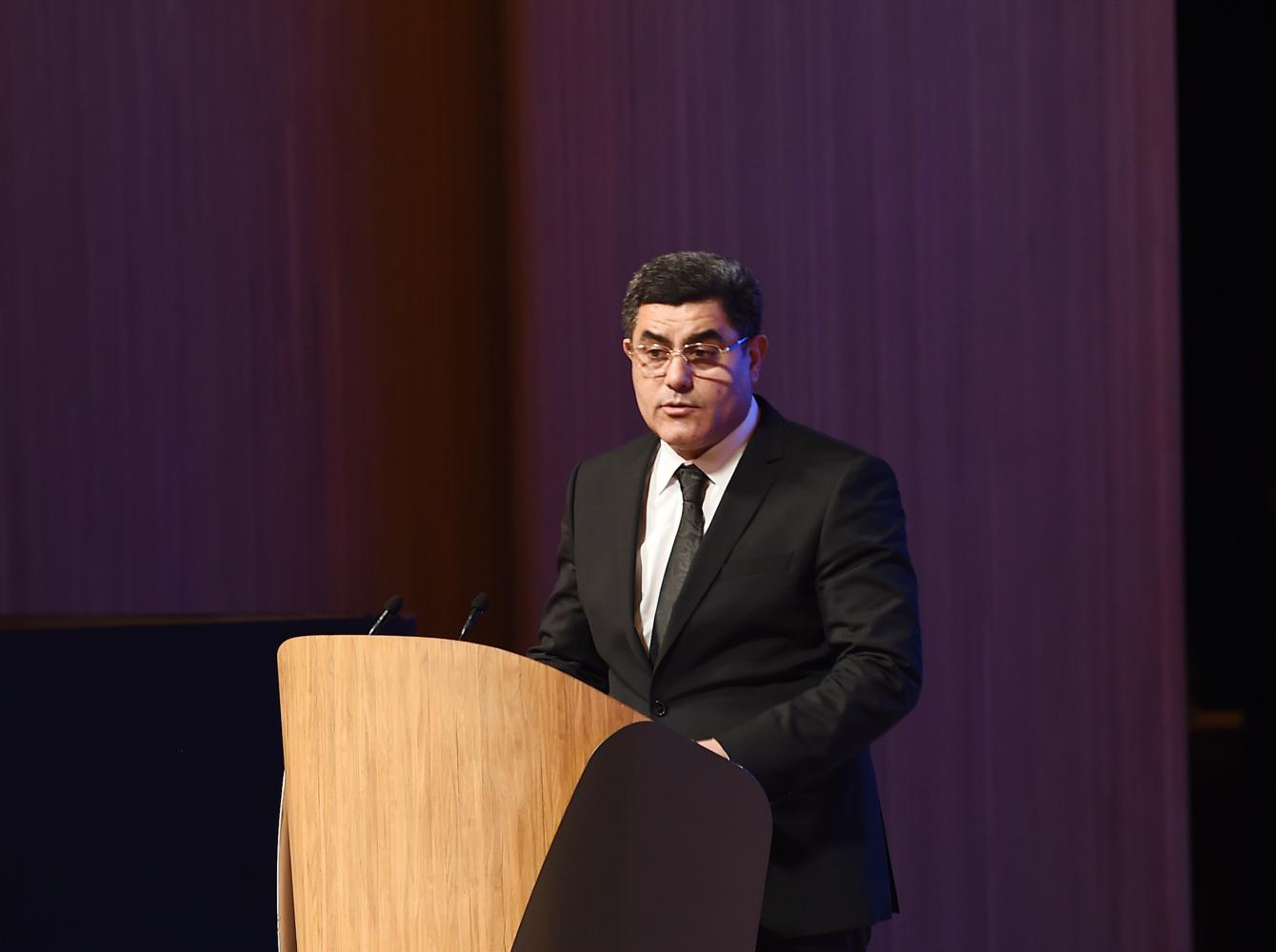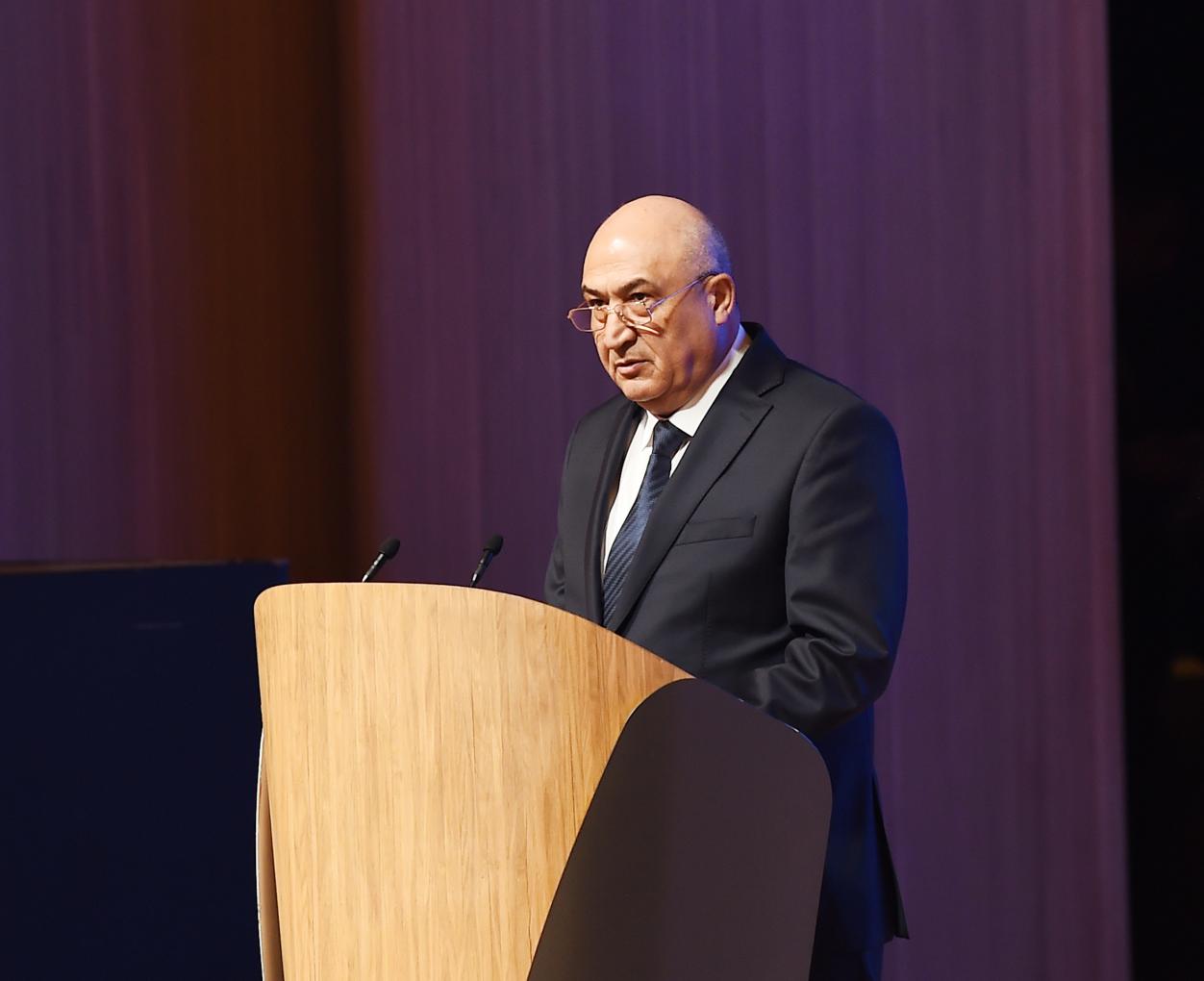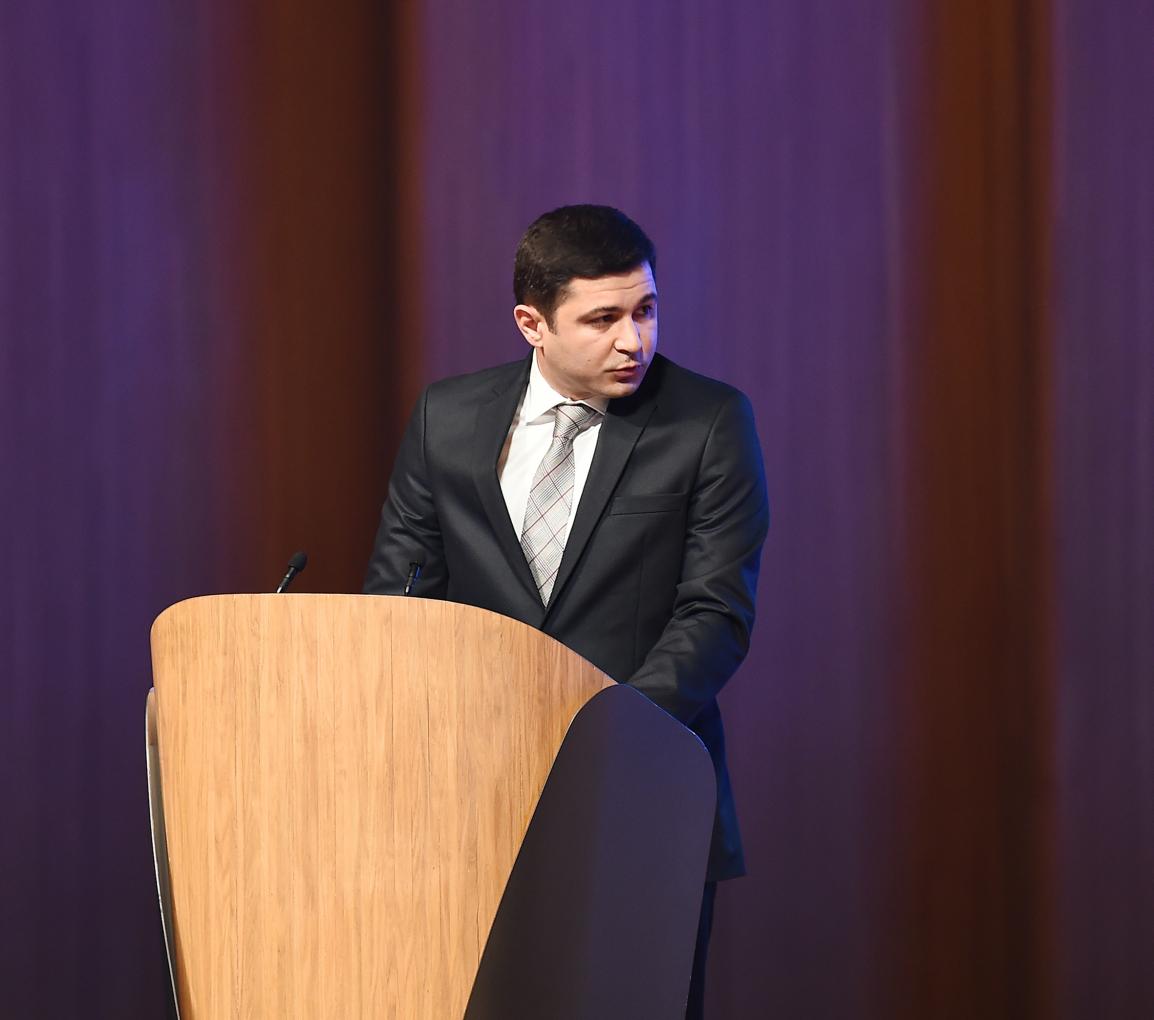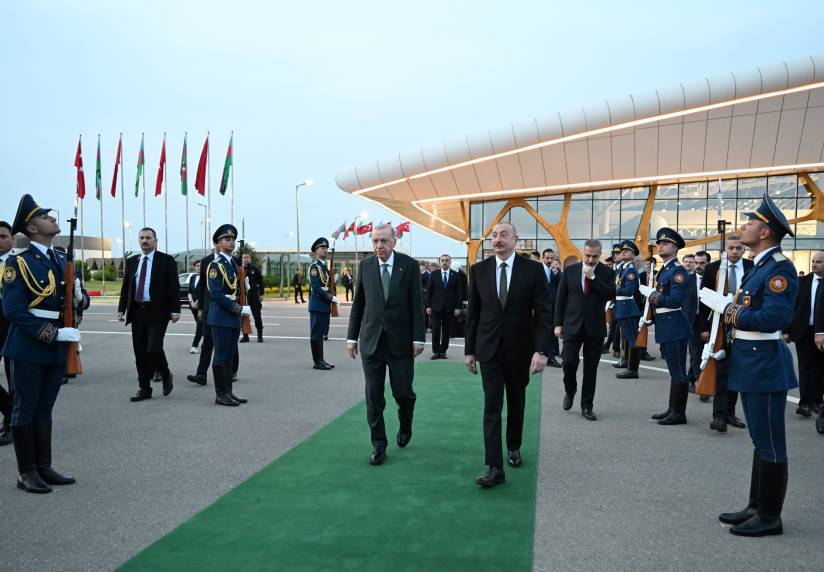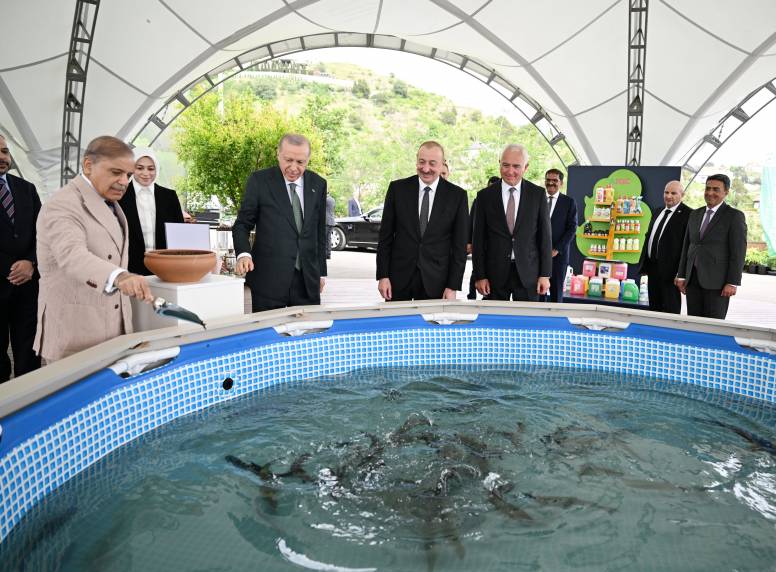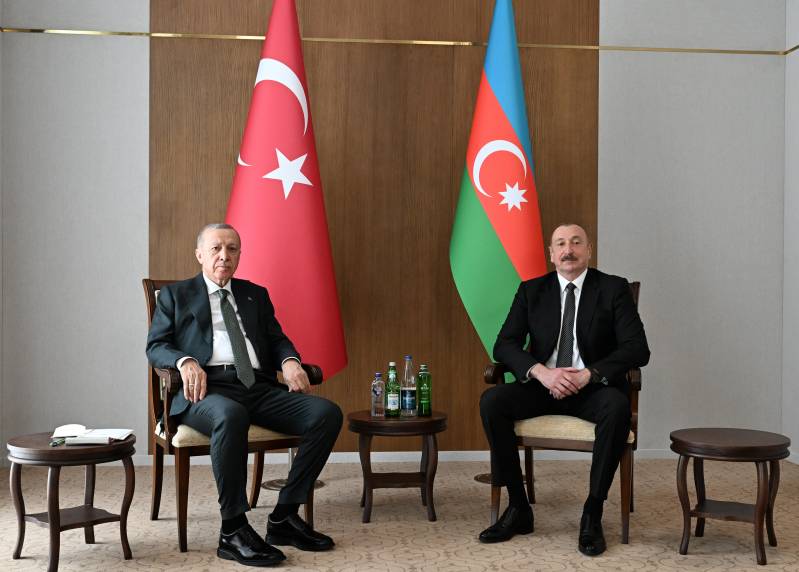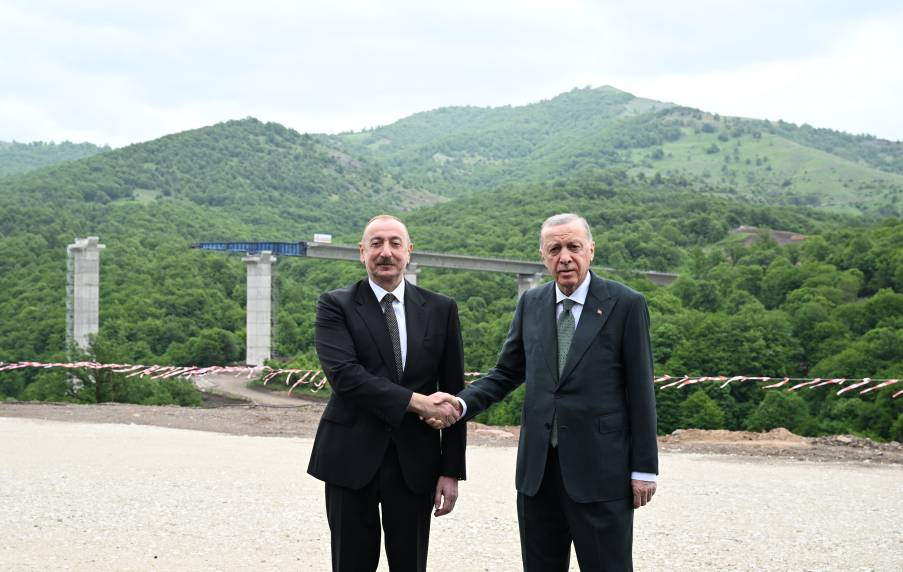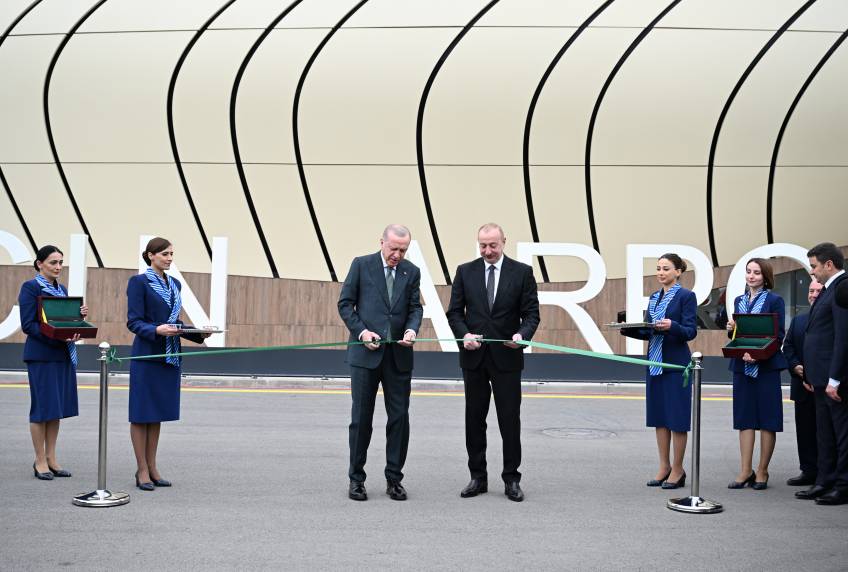A conference dedicated to the results of implementation of "The State Program on socio-economic development of the regions of the Republic of Azerbaijan in 2014-2018" has been held.
President of the Republic of Azerbaijan Ilham Aliyev attended the conference.
The head of state made an opening speech at the conference.
Opening speech of President of the Republic of Azerbaijan Ilham Aliyev
- The third state program on the socioeconomic development of the regions has been executed. The program adopted five years ago has been over-fulfilled. All the objectives that we set for ourselves in the past five years have been met. The third program is of great importance. This program has enabled us to give an impetus to the reforms carried out in the regions, to the work being done over these years.
As you know, the adoption of programs on the socioeconomic development of the regions of Azerbaijan was one of the commitments I made on the eve of the 2003 presidential election. I said at the time that if the Azerbaijani people showed confidence in me, I would first of all tackle the development of the regions, I will make every effort to solve problems in the regions. The first program was adopted in February 2004 and the program we are discussing today is the third one.
Therefore, when speaking about the work done, of course, we should examine the work done in the past 15 years. This work is manifested in real life, in numbers and in our cities improving and changing their appearance. Over the past 15 years, the Azerbaijani economy has developed at a record pace on a global scale. Our gross domestic product increased 3.3 times. I want to say again that this is a record figure on a global scale. Industrial production has increased 2.6 times. Our exports have increased 4.7 times, foreign exchange reserves 24 times and now amount to $45 billion. This shows that despite major investments in the regions of Azerbaijan, in the oil and gas sector and in the development of Baku, we have managed to increase our foreign exchange reserves 24 times. This enables us to be very optimistic about the future. The Azerbaijani economy is sustainable now.
This successful policy has led to major investments in our country. In 15 years, about $250 billion have been invested in Azerbaijan, and half of that is foreign investments. So Azerbaijan is a very attractive country for foreign investors. The investment climate in Azerbaijan stimulates foreign investors.
I want to bring another fact to your attention. Azerbaijan was mentioned in the World Bank's Doing Business report for the first time in 2006, when it was in 98th place. As a result of the fundamental reforms carried out and the improved investment climate, Azerbaijan ranks 25th in the world according to the latest report. In other words, this gives us grounds to say that both local and foreign investors will continue to invest heavily in Azerbaijan. This investment will continue to create jobs and new enterprises and confidently develop our country.
Over the past 15 years, 2 million new jobs have been created. The population has increased by 1.6 million people. This is also an excellent indicator. The bigger the population, the more rapidly our country will develop. But, of course, we must continue to organize our work in such a way that economic development and creation of jobs outpace population growth, so that the growing population is provided with work. Job creation was an integral part of the programs on socioeconomic development of the regions and, as I have already noted, 2 million jobs have been created. A significant part of them falls on the regions. Agriculture has increased 1.7 times. I am sure that growth will go faster in the future.
In a nutshell, all our economic indicators suggest that Azerbaijan has successfully and confidently developed for the past 15 years. Our increased economic opportunities have allowed us the opportunity to pay great attention to social issues. I would like to voice a few numbers. Over the past 15 years, wages have been increased seven times and pensions nine times. Over the past 15 years, more than 3,200 schools have been overhauled or rebuilt, 640 medical institutions have been built and reconstructed, and 44 Olympic centers have been established in the regions. This shows again that our policy is socially oriented and we primarily channel our revenues into the social sphere.
Problems of the internally displaced persons have always been the focus of attention, and this is still the case. In recent years, more than 100 settlements have been built and provided to the IDPs. Martyr families, war veterans and those disabled in the war have been provided with 6,650 apartments, and this process continues. People of this category will be provided with houses. In other words, Azerbaijan is a country paying a lot of attention to the social sphere. We have managed to combine the principles of a market economy with those of social justice in our country, and I believe that the successful development of Azerbaijan is underpinned by that.
Various processes have taken place in the world in the past 15 years. The world has changed a lot. Fifteen years ago, the situation was completely different. The risks, threats, hotbeds of conflict and wars are intensifying today, and unfortunately this trend is deteriorating. In our region, in the Middle East, in the CIS and in our immediate vicinity, extremely dangerous processes are taking place today. They have led to great disasters. Millions of people are suffering from wars. Millions of people have been killed, injured, went missing and found themselves in the situation of refugees and displaced persons. Most territories of some countries are in complete ruins. This is a major humanitarian disaster. It is possible to say that we observe this in the media on a daily basis and, unfortunately, this trend continues. Against this negative background, our government is realizing a strategy towards confident and dynamic development and is leading our country forward.
Azerbaijan is a space of stability and security. Recent history has clearly demonstrated that when the stability of a country is disrupted, it finds itself in a very difficult and uncontrolled state, the economy falls apart, the industry gets paralyzed, people suffer, and decades are needed to get out of this situation. The main factor of the successful development model of Azerbaijan is that our policy enjoys popular support. After all, this policy is designed to improve the well-being of our people. This policy is designed to turn our country into a strong state. As a result of this policy, Azerbaijan can openly speak from various platforms around the world, conducts an independent policy and fully protects its interests.
The economic and political reforms carried out in Azerbaijan, the strengthening of our country have enabled us to protect ourselves from the risky processes unfolding around the world. I want to say again: the main goal of our foreign policy is to allow us the opportunity to manage possible risks from the outside, mitigate and eliminate them. We are achieving this. For the past 15 years, the people of Azerbaijan have lived in peace and tranquility. The people of Azerbaijan live and create in the conditions of peace. I believe that every patriot can be rightfully proud of his country and the present-day Azerbaijan.
As I have already mentioned, over the course of 15 years we have taken important steps to improve the business environment and provided tremendous support for the development of entrepreneurship. The size of the loans provided to entrepreneurs on favorable terms alone exceed 2 billion manats. It is gratifying that only one billion of this amount was allocated from the state budget. The rest, exceeding one billion manats, was provided from the already repaid earlier loans. We have thus created fairly large financial resources. This enables us to alleviate the burden from the state budget and provide further financial support to entrepreneurs on favorable terms.
The process of industrialization is successfully powering ahead. The launch of industrial estates has gained momentum lately. This process is currently ongoing in several cities and we have 67 residents in industrial parks. Forty of these are already functioning.
The establishment of agricultural estates can also be regarded as a very positive development. The program provides for the creation of 51 agricultural estates. Of these, 17 are already functioning. As a result of the launch of the remaining agricultural estates, jobs will be created in the regions and the production and exports of our agricultural products will further increase.
Over these years, we have become a space-faring nation. This is also a source of pride for us. We already have three satellites. Azerbaijan is one of a handful of countries to have joined the space club. This is about innovation, business and modernity. As for innovation, there is a brand called "ASAN xidmət", which is known in the world as a product of Azerbaijan. It was created by us. It is our intellectual product and an expression of our will. Today, "ASAN xidmət" operates in several countries and the number of countries using this system is growing. Fifteen "ASAN xidmət" centers have been established in our country. By the end of this year, their number will reach 20. These centers have processed over 26 million applications. The approval ratings are close to 100 percent. "ASAN xidmət" provides more than 200 services in a completely transparent manner and without any violations. This area, as you know, has always been of great concern. Our people had legitimate complaints. There are no complaints now and the successful operation of "ASAN xidmət" is a reflection of our policy. Everything in Azerbaijan should be transparent, everything should be within the frames of law. This shows again that serving the people is one of the main tasks of our policy.
Of course, the oil and gas sector is the main branch of our economy. It is the case today, it was the case before and it will be the case in the future. We are simply trying to rapidly develop the non-oil sector and are achieving that. But regardless of the public and political formation, this has been the key economic driver ever since first oil was discovered in Azerbaijan. We are using these natural resources very rationally. The commissioning of the Baku-Tbilisi-Ceyhan and Baku-Tbilisi-Erzurum oil and gas pipelines is a great historic event. If these projects had not been implemented, we would not be able to receive such revenues because our export opportunities are limited, we do not have access to the world ocean and we definitely need oil and gas pipelines. The construction of these pipelines was a very difficult project both financially and politically, and also from the point of view of international cooperation. We managed to do that. Today, these two pipelines are delivering our resources to world markets. The construction of the Southern Gas Corridor, one of Europe's largest infrastructure projects, is currently under way. This megaproject consisting of four projects is already in its final stages. Three of the four components have already been commissioned. The TANAP and the Southern Gas Corridor were inaugurated last year, and this is a historic event.
We have channeled our oil and gas revenues into the transport sector in order to turn Azerbaijan into a transport hub not only in this region but also of Eurasia. We are already achieving this. The commissioning of the Baku-Tbilisi-Kars railway is a historic event. It is an extremely important project, as it enables us to transport large volumes of cargo from East to West and from West to East through the territory of Azerbaijan. This enhances our geopolitical significance. At the same time, we will always earn currency thanks to this. The creation of the North-South corridor is also of great importance. A lot is being done in this direction. Of course, this work requires large-scale international cooperation. Azerbaijan has played a positive role in this area as an initiator. Today, the number of countries connected via the East-West and North-South transport corridors exceeds 10, and their number will grow. But only Azerbaijan participates in both projects. Therefore, we are turning into a strategic transport center of Eurasia. The Baku-Tbilisi-Kars railway, the Alat international trade seaport, our road infrastructure, modern and modernizing infrastructure have all been created in recent years. If we had not paid so much attention to infrastructure projects, there could be no talk of any development today.
Fifteen years ago, we could not provide ourselves with electricity. We either imported it from abroad or some regions of our country were left without light. Over the past 15 years, 31 new stations have been built and a new capacity of 2,500 megawatts have been created. Today we don't simply provide ourselves, we also export electricity. Fifteen years ago, the supply of natural gas was at about 50 percent; today, this figure is at 95 percent. The provision of drinking water was at 26 percent, but today it is at 70 percent. In 15 years, 15,000 kilometers of roads have been built.
In other words, we could talk for hours about the work done. I have simply brought the key points to your attention. I am sure that in today's speeches and discussions we will talk about the work that has been done and our plans. We will ensure the implementation of further development plans.
Other speakers at the event included chairman of Khazar car plant in Neftchala Industrial District Emin Akhundov, head of Shaki City Executive Authority Elkhan Usubov, head of “Nakhchivan Baghlari” Ltd Elchin Baghirov, head of Aghjabadi District Executive Authority Shahin Mammadov, director of Saloglu Tajaddin Mustafayev, head of Masalli District Executive Authority Rafil Huseynov, director of Mughan Agroservice Ltd Rajab Orujov, head of Gusar District Executive Authority Shair Alkhasov, and director of “Hajigabul Gushchulug” Ltd Nemat Babashov.
The head of state made a closing speech at the conference.
Closing speech of President of the Republic of Azerbaijan Ilham Aliyev
- Today we will also express our thoughts related to the work ahead. The successful execution of programs gives us grounds to say that their adoption is quite logical. Our economic indicators, the creative work and improvement in the regions are clear evidence of that. But there are still unresolved issues. There are issues it has been impossible to resolve or are not of top priority. We should not be content with the work done and should always look forward. They should know what is missing and what issue needs to be solved.
In principle, all major issues related to infrastructure have been resolved. But this process will be continued. As for electricity, as I have already noted, we can fully provide ourselves now and even export it in large quantities. However, there is a need for the construction of new power plants because our growing industrial potential, population, agricultural development and the creation of large industrial clusters require an increase in electricity production. This year we plan to open a large power station in Baku. The opening of the "Shimal-2" station with a capacity of 400 megawatts is expected. At the same time, work was done related to the construction of a new station with a capacity of 300, 350 and maybe even 400 megawatts in Baku. At the present time, verification is under way. The construction of this station will further strengthen our energy potential. In parallel, by carrying out restoration and repair work at existing stations, we can significantly increase their potential. Preliminary calculations show that we can generate an additional capacity of about 500 megawatts.
Thus, if all these three issues are resolved, and I am sure that this will be the case, we will produce an additional 1,500 megawatts of electricity, meet the growing domestic demand and also export electricity and bring currency to our country. In parallel, work should be carried out to create renewable energy sources – first of all, the construction of hydroelectric, solar and wind stations. Foreign investors are showing interest in this area now. The meetings I had at the World Economic Forum again show that major companies are ready to invest in this area and are examining these opportunities. I think this is a very positive fact because new technologies that have significantly increased efficiency have been created in this area. I think local companies should also pay attention to these matters.
The level of gasification in the country is 95 percent. Of course, this does not mean that we should be complacent. There are villages where there is still no gas. Therefore, this process will be continued although there are not too many countries in the world conducting such a policy of gasification. In other words, we have solved the main problems associated with gasification in recent years. The main task now is to continue this process and improve the quality of gas. Sometimes there are interruptions, sometimes gas is not supplied in the required volumes. This issue should always be in the spotlight so that there are no shortcomings here.
Drinking water projects are ongoing. As I noted in my opening remarks, water supply has reached 70 percent. So far, the implementation of drinking water projects has been completed in 38 cities, will be completed in five cities this year. Work has already begun and is ongoing in 12 cities and has not yet started in several other cities. These issues are always on the agenda, they will be reflected in the fourth program to be adopted.
The process of land reclamation measures will be continued. For the past two years, we provided water to 100,000 hectares of land annually. Most of these lands had never been irrigated before, some were irrigated but not properly. According to preliminary calculations, this work will be carried out on 80,000 hectares this year. This will enable us to increase the yields and area of irrigated lands. This is a very large figure, and I am sure that farmers will feel the difference.
In recent years, four large reservoirs have been built – Takhtakorpu, Shamkirchay, Goytapa and Tovuzchay. Their capacity is 470 million cubic meters. Construction and rehabilitation work was carried out at several reservoirs. The construction of small reservoirs is also one of the issues on our agenda. Every year, at least 300 sub-artesian wells are drilled at state expense, which also brings great benefits.
As I noted in my opening remarks, we built 15,000 kilometers of roads over the course of 15 years, and this process continues. According to the State Investment Program for this year, the roads of hundreds of villages will be landscaped. This includes the construction of main roads. According to the Davos World Economic Forum, Azerbaijan ranks 34th in the world for the quality of roads.
The process of creating a social infrastructure will also be continued even though 3,272 schools have been built and renovated. This constitutes 73 percent of all schools. But there are still schools in need of renovation, and this work will also be envisaged in the next state program. The construction of hospitals and Olympic centers will also be continued. This year alone we expect to open three Olympic centers. And this serves the development of sports in the regions.
As you know, more than 5 million people undergo medical examination every year. This is also our initiative, a very positive one. We now have hospitals fitted with modern equipment everywhere, so that our people can undergo medical examination. This is also a very serious social project, and Azerbaijan is an excellent example in this area.
The problems of internally displaced persons are always in the spotlight. Last year, houses for 5,800 displaced families were built, including homes for 1,000 families built by the private sector. I welcome this initiative. This year, this process will be continued. According to preliminary estimates, homes will be built for at least 5,000 families, including a serious contribution of the private sector.
Problems of martyr families and those disabled in the Karabakh war are also being addressed. Last year, 626 martyr families and those disabled in the Karabakh war were provided with homes. This year, 800 more families will be provided with homes. In the coming years, this process will be continued so that all martyr families and those disabled in the Karabakh war can be provided with housing. To date, 6,650 families from this category have received housing.
Last year, 118,000 jobs were created. This is a good indicator. Job creation should be a permanent process, and the private sector should certainly play the key part in this area, of course. When a reported is made on the composition of each loan provided with state support, there is always a question on how many jobs will be created. Increasing the employment rate is a very serious matter. In some countries, the population doesn't grow, in others it declines. The population of Azerbaijan is increasing. I have already noted that over the past 15 years our population has increased by 1.6 million people. Of course, this requires very serious work from us. I want to say again: the creation of jobs is a priority issue. In the regions where there is unemployment, we have opened public works to tackle unemployment. This initiative has been implemented for several years already. Thousands of people are engaged in public works and get paid.
Of course, numerous enterprises have been created and jobs created in them in recent years. I would recommend that entrepreneurs not cut jobs. The overall trend in the world is that more preference is given to technology, scientific and technical progress contributes to the emergence of new technologies and robots gradually replace people – all this is a reality. We must reckon with this reality. At the same time, we need to preserve jobs in Azerbaijan – both in state bodies and in the private sector. The structural reforms underway in state agencies – all state bodies have already been notified – should not lead to job cuts. This restructuring is simply aimed at improving the mechanism of governance. Of course, those working in state-owned institutions will remain in their places. The private sector should not lay off people either. On the contrary, with such state support, it should create even more jobs. Let me reiterate that the process is moving forward in this direction. Last year, 118,000 permanent jobs were created. Of course, these are jobs created in the private sector.
The implementation of the self-employment program gives great hope. This year's program will cover 7,000 families. We will see if it is possible for the program to cover more families. Thus, those who have not yet been able to find a job will contribute to the family budget by means of self-employment.
"ABAD" centers of easy support for family businesses are being set up. This is also a very positive phenomenon. I have participated in the opening of these centers. This is one of the branches of "ASAN xidmət" and is also a very positive initiative. I believe that family businesses as a direction can and should gain momentum in Azerbaijan. The state provides and will certainly provide such support. I expressed my opinion on the activities of "ASAN xidmət" centers in my opening remarks. This year we plan to open five centers.
Local executive authorities should always be attentive and heedful to people. They should not forget that they work for our citizens. They should not forget that they are serving them. All government officials – from the President to the lowest-level official – should remember that our main goal is to serve people. Local executive authorities need to be attentive and solve problems. If they cannot solve a problem themselves, they should inform central executive bodies and the Presidential Administration, so that we could quickly resolve these problems. We can solve problems. Of course, the mistakes made must be completely eliminated.
The Fourth State Program on the Socioeconomic Development of the Regions is mainly based on requests from the field. My numerous visits to the regions and conversations with citizens have created wonderful contacts in this area because people's proposals are always taken into account. Many projects in the regions have been implemented on the basis of such proposals. Therefore, such contacts should be permanent, and it is there, in order to solve the issues that have not yet been solved. We have both opportunities and determination to do that.
Our policy in relation to entrepreneurs will be continued. The state provides entrepreneurs with great support – moral, political and material. Farmers are provided with loans and subsidies. There is also improvement in this area. Equipment, fertilizer and fuel are provided on preferential terms. Azerbaijan is one of a handful of countries that pays so much attention to its entrepreneurs and farmers. Of course, we expect more impressive results from entrepreneurs. We expect them to continue making contributions to the country's economy.
Agriculture and industrial production have a special place in the fourth program. Of course, infrastructure projects are also in the spotlight. However, as I have already noted, a significant part of them has been completed or is close to completion. Therefore, the real economy, agriculture and strengthening of industrial potential are among the main issues. Different mechanisms have been deployed and various initiatives have been launched. One of them is the investment promotion mechanism. Since the launch of this initiative we have received excellent results. A total of 107 projects have been implemented under the investment promotion program. In total, there are plans to implement 332 projects. The investment to be made in the implementation of these projects amounts to 2.8 billion manats. In other words, if we had not engaged the investment promotion mechanism, these funds would not have been invested. As part of these projects, an additional 12,000 jobs will be created.
Of course, industrial zones and industrial parks play a very important role in the development of our industrial potential. Azerbaijan has become a modern industrial center now. I am sure that the work to be done in this area will ensure the development of the non-oil sector of the country and significantly increase the volume of non-oil exports.
Of course, the work in the oil industry is also in the spotlight. As I mentioned in my opening remarks, megaprojects are being implemented in this area. However, in parallel with this, domestic production should remain stable, i.e. oil and gas production by SOCAR. Last year, 38.8 million tons of oil and 30 billion cubic meters of gas were produced in Azerbaijan. Major projects have been implemented. I am sure that the implementation of the Southern Gas Corridor project, which is scheduled for commissioning in 2020, will bring us additional revenues.
Of course, our focus in industry is also on the non-oil sector. There are good results in this area as well. Last year, our non-oil industry grew by 9.1 percent. This suggests that work in this area is carried out at a high level. The Sumgayit Chemical Industrial Park, the Sumgayit Technology Park, the Mingachevir Light Industry Park, the creation of industrial enterprises in Ganja, the Neftchala, Hajigabul, Masalli and Sabirabad industrial estates are major steps in this area. In the future, industrial zones will be created in other cities.
We have been doing very serious work recently in relation to the development of the traditional art of carpet weaving. Twenty carpet factories are already in operation. On average, there are 100 or 150 jobs in each factory, especially for women. I have attended the opening ceremonies of most of these factories and seen how great the needs are for that. This is a very thoughtful step aimed at providing women with jobs and developing our ancient national craft. In general, we plan on building 31 carpet factories where about 5,000 jobs will be created. A spinning and dyeing factory is expected to open in Sumgayit this year. Thus, we will eliminate the dependence on foreign raw materials in the production of carpets.
There is also a need for the construction of cotton yarn and finished textile factories. We have cotton yarn factories. According to available data, approximately 50 percent of harvested cotton is already processed in Azerbaijan, which creates added value. It is very good. However, entrepreneurs should know that the potential is much bigger. Cotton production in Azerbaijan is growing. Therefore, I believe that entrepreneurs should take the construction of cotton yarn factories very seriously. This is a very profitable business for our country. Serious steps are also being taken in connection with the development of sericulture. A center for cocoon breeding is already being set up in Gakh District. This will enable us to reduce dependence on imports and create an excellent chain – from seedlings to silk fabric. The state took up most of the work. But entrepreneurs should also take interest in the sector. I believe that this may be useful for them.
There is a need for establishing new fruit and vegetable processing enterprises in our country. I want to highlight this because the production of fruits and vegetables is growing. We export them more like fruits and vegetables but there is a great demand for processed products in foreign markets.
We need to deepen reforms in agriculture. Agriculture should develop on a scientific basis. It is necessary to apply modern technologies and approaches. We should continue to do serious work related to the food security – this is a priority issue. Work is under way towards increasing the yields. I believe that it will manifest itself in the near future. We must increase the exports of agricultural products. It is true that the exports of agricultural products have grown about six times in the past 15 years. But the potential is far bigger and we have to enter new markets. Trade houses are opening, export missions are established, the state provides great support to entrepreneurs so that they can sell their products abroad. Of course, agricultural estates are of great importance. Currently, there are 51 agricultural estates covering an area of 250,000 hectares. Of course, work was either not carried out or was carried out very slowly on these lands earlier.
I would like to cite some figures related to agricultural products. In grain-growing, for example, 2 million tons of grain was harvested in 2004, whereas last year the figure reached 3,200,000 tons. So there is good growth. In particular, in large farms and agricultural estates the yield is 50 quintals per hectare. In some places it is even higher. It is an excellent indicator. This indicator is at the level of developed countries of Europe. But the average yield per hectare is 29-30 quintals.
I have in front of me a table of wheat yields. Four districts – Saatli, Barda, Tartar and Sabirabad – have harvested more than 40 quintals per hectare. 28 districts have harvested 30 to 40 quintals. The other districts have harvested less than 30 quintals. These tables have been prepared by the Ministry of Economy and the Presidential Administration. They are available and will now be handed out to you. Let businessmen have a look at them. We need to see how we can increase the yields in certain districts.
Let me note for information that the average yield per hectare in the world is 34 quintals, in Azerbaijan 30 quintals and in the European Union 53 quintals. In large farms, we have 50 quintals. We have reached the level of the European Union but only in large farms.
I want to cite some figures related to animal husbandry. In 2004, we procured 196,000 tons of meat, whereas last year the figure reached 326,000 tons. There is growth in this sector too. Pedigree cattle is imported and a center for artificial insemination is in operation. I believe that progress in this area will be high. In the next five years, we should increase beef production by 15 percent.
Milk production in 2004 was 1,200,000 tons and reached 2 million tons in 2018. Growth here is also very big. We still cannot fully provide ourselves with milk and dairy products. As a result of the work to be done in the next five years, milk production should increase by about 15-20 percent.
Poultry production in 2004 was at 44,000 tons and reached 109,000 tons last year. Vegetable production in 2004 was at 1 million tons and at 1.5 million tons last year. Agricultural products fetching the largest amount of currency: tomatoes $177 million, persimmons $114 million, cotton and cotton products $108 million, hazelnuts almost $100 million and apples $38 million.
Fruit production in 2004 amounted to 420,000 tons and in 2018 to a million tons. That is, it has more than doubled. I am providing all this information to entrepreneurs and the public so that they know what growth there has been and what more we need to increase. We are accessing foreign markets with state support.
As you know, a lot of attention has recently been paid to hazelnut farming. In a short period of time, we significantly increased hazelnut areas. In 2016, the area of our hazelnut gardens was 40,000 hectares, but today it has reached 75,000 hectares. This year hazelnuts will be planted on another 9,000 hectares. Thus, we will be growing hazelnuts on 84,000 hectares. Of course, new gardens will bear fruit only in a few years. But after that, hazelnut exports will more than double and bring more than twice the current income to farmers. Currently, 20,000 people are engaged in hazelnut farming.
The creation of almond and walnut orchards has gained momentum lately. This product is also very profitable and exportable. We should definitely envisage the construction of factories for the processing of almonds and nuts in Azerbaijan. I recommend that entrepreneurs tackle this business. At the same time, the development of olive-growing, a traditional sector especially for Baku, Absheron and other regions, is progressing fast. New olive orchards are being extensively established.
A serious turnaround has been achieved in cotton-growing. For comparison, I should note that whereas only 35,000 tons of cotton were harvested in 2015, the figure reached 233,000 tons last year. Look at the progress we have made! A total of 290,000 people are engaged in all areas of cotton-growing. Our yields are still not at the desired level. The average yield per hectare is 17.4 quintals. We can't be happy with that and must increase the yields. But this is the average yield. Where work is taken seriously, yields are higher. For information, I should note that yields on the cotton fields of "MKT" are 27 quintals per hectare, of "AzerPambig" 19 quintals, but in smaller farms it is low. Therefore, this reduces the average yields. Therefore, it is necessary to conduct an audit of this area. It is necessary to select lands suitable for cotton-growing and, where the yields are low, cultivate something else. 470 cotton harvesters and about 12,000 units of machinery for cotton-growing have been acquired through the state.
There is very serious progress in tobacco-growing. In 2015, tobacco was grown in only three districts. Tobacco-growing was practically being squeezed out. Only 3,400 tons were collected in three districts, while last year 6,200 tons of tobacco were collected in 13 districts. The state provides support for this sector too. Drying chambers and equipment for harvesting – all this is provided by the state. In just three years, 9,500 people were provided with jobs in tobacco-growing. Let me reiterate that if the state had not provided this support and tangible assistance, these sectors could not develop so fast. A special meeting on tobacco-growing was held with my chairmanship. That meeting issued instructions and they are being implemented.
A meeting on horticulture was also held. The picture here is generally very interesting. In Soviet times, cocoon-breeding had great traditions. In particular, on the initiative of Heydar Aliyev, cocoon production in many districts was at the highest level. But in 2015 we saw that cocoons were harvested in only one district, and only 230 kilograms. Serious measures were taken quickly. Last year, 513 tons of cocoons were harvested in 38 districts. We have increased the harvesting of cocoons from 230 kilograms to 513 tons. This year the plan is 800 tons. Of course, this is the main condition for high-capacity operation of the Sheki silk factory and job creation there. Last year alone, 2,600,000 mulberry seedlings were planted.
Work is underway in other sectors as well. I have held meetings on tea, rice and citrus farming. There is also progress in this area. Beekeeping also has enormous potential both for the domestic market and for exports. Our honey is of very high quality. It is valued highly in foreign markets. We now support beekeeping as part of the family business. Subsidies are also provided and have recently been increased. Beekeeping has great prospects. It is a very profitable sector. It can give farmers and citizens excellent results.
Viticulture and winemaking. In 2004, we harvested 55,000 tons of grapes, while last year the figure reached 167,000 tons, i.e. three times more. State support here, of course, is also in the foreground. Viticulture and winemaking used to have great traditions in Azerbaijan. But in Soviet times, in the late 1980s, as a result of the joint negative actions of Soviet leadership and leaders in Azerbaijan, it is possible to say that a process of removing our vineyards began. Most of the vineyards were destroyed. Of course, it requires large funds and labor to restore them. Grapes are a perennial plant. Therefore, a triple growth is an excellent result, of course. Wine production has increased five times in 15 years.
Of course, when considering issues of socioeconomic development of the regions, we must pay attention to the environmental situation. We must improve it and protect ourselves from the factors that disrupt the environmental balance. Focused work has been done in this direction in recent years. I believe that this issue should always be in the spotlight. In particular, enterprises that violate the environmental balance in Baku, Sumgayit and other major cities should be given a very serious warning so that they prevent air pollution by installing cleaning equipment. It is not too difficult. Other environmental issues must also be resolved.
I also mentioned some railway projects in my opening remarks. The North-South and East-West transport corridors are functioning and new partners are joining this work. As a result of the talks I have had with several heads of state, the delivery of additional cargo from the republics of Central Asia to the port in Alat and from there by rail to world markets has been ensured. We already fruitfully cooperate with several countries. The number of these countries is growing. We attract goods from new sources and send them through the territory of Azerbaijan. Several railway projects within the country are also on the agenda. We are engaged in the restoration of the North-South transport corridor. It is true that the road is there and it functions, but the speed is too small. Therefore, it is necessary to build new railway lines from Yalama to Astara. This process already started last year, so the North-South transport corridor connecting the Azerbaijani-Russian and Azerbaijani-Iranian borders will become a high-speed corridor. Of course, the cargo delivery time to the final destination will also be reduced.
The construction of intercity railways is also under way. The Laki-Gabala railway is currently under construction. Today, Gabala is one of the centers of tourism, therefore, in parallel with the construction of the Baku-Yalama railway, it is necessary to ensure the construction of this road too. The railway should also be extended to the Shahdag ski resort. Thus, it will also be possible to reach Gusar District by rail. This is also envisaged in the program.
As for the construction sector, we are currently implementing major projects through state channels. The State Housing Agency is implementing two major projects in Yasamal district and in Hovsan. This process was also initiated by the state. The construction of social housing is of great importance. Our citizens are using it. At the same time, it gives a powerful impetus to the construction sector. This can greatly support both the construction materials sector and the construction sector proper.
As you know, the number of visitors to Azerbaijan has gradually increased in recent years, and this is a very positive fact. The number of tourists grew by about 6 percent last year. Last year, more tourists visited our country than in previous years – 2,850,000 people. According to calculations, these tourists spent about $2 billion in our country. That, if I may say so, means an additional $2 billion in exports. This figure alone demonstrates the great importance of tourism. This money goes to the service sector, and citizens and businessmen benefit from that. In other words, this money goes directly to companies that provide various services to tourists in the regions because a significant part of tourists travels to the regions of Azerbaijan too. All the necessary conditions are being created, and the tourism industry in Azerbaijan should have very broad opportunities. All necessary initial conditions for that are available. There is security and stability in Azerbaijan, and our people are very hospitable. We have a wonderful climate and there are different types of climates. A modern infrastructure has been created. There are six international airports, modern roads, railways, hotels, beautiful nature, resorts, winter and summer skiing opportunities, seaside resorts, medical tourism, etc. For example, Naftalan has become a major tourist center now. A large number of visitors come to other medical institutions – the medical center Duzdag in Nakhchivan. People come to Galaalti for treatment. We have a lot of historical monuments. They are also of great interest. Our geographical location is also favorable. Baku is one of the most beautiful cities in the world. So all these factors suggest that the tourism industry will develop at a very high rate in Azerbaijan.
Of course, it is impossible to cover all the directions envisaged in the program in one speech. I have simply brought the key directions to the attention of the public.
In general, I have to say that, according to preliminary estimates, at least more than 17 billion manats is provided for the implementation of the fourth state program on the socioeconomic development of the regions. It is estimated that 4.6 billion manats of this amount will be invested by the private sector in the form of investments in ongoing and future projects. State investment is expected to be at the level of approximately 13 billion manats. But, of course, this is a preliminary figure. I am absolutely sure that the figure will be higher, as is evidenced from the implementation of the previous three programs. Each of the three programs has been over-fulfilled. I am sure that the fourth program will be exceeded as well. It should be noted that our investment climate is more favorable now. As I mentioned in my opening remarks, the World Bank's Doing Business report ranks Azerbaijan in 25th place. So foreign investment is not reflected in this figure and it will still be made. Therefore, this is a very large number. Thanks to these investments, Azerbaijan will continue to develop successfully and confidently. I am absolutely sure that our country will continue to go only along the path of development, progress and victories. Thank you!

